#it depends which context I end up going for because if I use this as the song for him to play at their gig
Text
okay so I was doing a Research™️ about ancient Greek etymology as one does and I found some Things that made me want to Violently Claw My Arms Off please allow me to force feed you my discoveries
So there are 2 words for "not" in ancient Greek, depending on the context: ou and mē. Having introduced himself in the Cyclops episode as " ou tis", or No-man, he then stabs Polyphemus in the eye. When Polyphemus' brothers come to check on him, they say this:
"... surely no man [mē tis] is carrying off your sheep? Surely no man [mē tis] is trying to kill you either by fraud or by force?"
Right after this, after the other cyclopes ditch Polyphemus, Odysseus's inner monologue goes something like this:
"Then they went away, and I laughed inwardly at the success of my clever strategem [metis]." (pronounced mEH-Tis)
Now, there's a difference between mē tis and metis. [mē tis] (pronounced mEH-Tis with a space between the syllables) is the literal translation for "no man". Metis is a word for extreme intelligence/cunning, which is something Odysseus is famous for.
Now, there are several examples of abuse of metis/intelligence in the Odyssey, but I think the juxtaposition between [mē tis], or the concept of anonymity, and metis, or extreme intelligence, is REALLY interesting. Odysseus's adoption of the title "No-man" was characteristic of metis--it was a really smart move that simultaneously hid him from the cyclops and avoided any future consequences. It was a highly effective strategy all wrapped up in a nest little package with a bow on it.
But when he revealed himself as Odysseus of Ithaca, effectively throwing off No-man (anonymity and [mē tis]), that was characterized as idiocy--he's essentially doxxed himself, and now he's doing to (spoiler alert) get tossed around the Mediterranean by Poseidon for the next 10 years.
This is really interesting because it lets you see the parallels/codependency between metis(intelligence) and humility. When Odysseus refused to allow himself to go unnoticed (hubris) he suffered for it. BUT when he declined instant glory/satisfaction (kleos) in order to achieve the long term goal of survival, he was rewarded with Athena's favor (pay attention. This part is important).
And this situation repeats itself MULTIPLE TIMES in the Odyssey--the EXACT SAME THING happens near the end of the book, with the suitors. When. Odysseus is dressed as a beggar and the suitors/Antinious are abusing him, he ACTIVELY CHOOSES not to react--he doesn't stand up and rip off his disguise and start hollering "TIS I, ODYSSEUS OF ITHACA! FEAR MY WRATH"
No. He sits there patiently and waits. He plans and schemes and quietly orchestrates their downfall without alerting them of it. Why? Because he learned his lesson the first time this happened. He buried his rage and adopted what was, according to Grace LA Franz, a more feminine form of metis, weaving a web of destruction for his enemies that ultimately resulted in their total annihilation (see Weaving a Way to Nostos: Odysseus and Feminine Metis in the Odyssey by Grace LaFranz). His patience allowed him to win the whole prize--no questions asked, no 10-year-long-business-trip strings attached--just the sweetness of a full victory. And he is, once again, rewarded with Athena's favor--both in the battle with the suitors and in the aftermath (cleanup/reuniting with Penelope).
This really reinforces the idea in the Odyssey that Odysseus's defining characteristic is not just his intelligence--it's his ability to learn from his mistakes. He used what he learned at the Lotus Eaters Island against Polyphemus--the Lotus Eaters drugged his men, so he drugged Polyphemus. He used what he learned from Circe and Polyphemus against the suitors--Circe used false sweetness and honeyed words to lure his men into a trap, so that's exactly what he did to the suitors. His hubris on Polyphemus' island cost his whole crew their lives, so he intentionally left well enough alone until the right time. He didn't just learn from his failures--he turned them into BATTLE STRATEGY.
i don't care what anyone says that is completely totally and objectively awesome
#Odysseus is a certified baddie 112% of the time#he's literally the coolest you can't convince me otherwise#there's a reason that literally everyone has a crush on him#even the lesbians#its the wordplay. his words#read me a poem in iambic pentameter you bloody stinky man#literally everyone: his sad wet vibes and dark undereye circles have captivated me entirely#odysseus#the odyssey#tagamemnon#odysseus x penelope#telemachus#epic the musical#the cyclops saga#odysseus of ithaca#poseidon#etymology#ancient greece#ancient history
3K notes
·
View notes
Text
The way Astarion reacts depending on how you compliment him in the mirror scene (I have no interest in insulting him so I won't be covering that here, have fun though!) drives me fucking insane.
"I want to know what the world sees when it looks at me. What you see."
And you get two types of responses. First, your choices for compliments are
Strong, piercing eyes.
The creases when you laugh.
Pick the first, and he's pleased. "Go on," he says, sounding very seductive. You're giving him exactly what he wants, and he's encouraging it.
Pick the second, and he gets upset. He's an eternally young vampire, not your doting grandmother! You can do better than that. Even if you meant it as a compliment (I know my Tav definitely did), he doesn't seem to take it that way.
Your second options are
That dangerous smile.
The way your hair curls around your ears.
Once again, the first one pleases him, and he even praises your efforts. Very good. Now finish the scene and tell him he's beautiful.
But if you say the second, he gets exasperated. This is meant to be flattery, not poetry. Just tell him he's beautiful and we can call it a day, he says with a dismissive wave of his hand. He doesn't need to hear this crap, just tell him what he wants and fuck off.
Of course, it doesn't matter how you get to this point, and every dialogue option at the end of the scene nets you the same amount of approval. If you call him beautiful, it's +1. Call someone else beautiful, it's +1. If you ask whether he just wants shallow praise (aka don't call him beautiful), you get +1. So this is me pulling this out of my ass I guess.
I always choose to call him beautiful becuase 1) he is and 2) my Tav thinks so too and would oblige him if he asked for it that directly.
But I am obsessed with the different routes you can take to get to this point and what they imply.
Strong, piercing eyes and dangerous smile pleases him more outwardly, but doesn't actually affect the outcome. He's satisfied and confident with these compliments. They confirm what he's trying to project into the world, what he aspires to have and to be.
The creases when he laughs? The hair curling around his ears? Those are things he can't control, can't use against someone else. But he asked to be seen, and if this is what Tav sees, then what does that mean for him?
Why are they complimenting his laugh lines? Why are they speaking poetry at him? Why are they seeing things he has no control over, and why are they revealing them to him?
He doesn't want shallow praise. Questioning this nets approval, and giving it to him doesn't increase approval. What he wants is assurance that what he's trying to be is what the world sees, that he's in control.
And if you actually act as a mirror, point out the things unique to him that you see, he gets uncomfortable, because you're showing a reflection of someone he thinks he's not, of someone he has no control over. And that's scary, even if it's supposedly complimentary.
Because what's scarier than losing control?
But then, compared to how genuinely upset he seems when you insult him (I looked these up on YT for context), the laugh lines and hair curls are still accepted as compliments. So what does he think when Tav says these things?
They see past his piercing eyes and dangerous smile. They see something else that they like even more, things he's not aware of or doesn't appreciate as much. What does that feel like, to cultivate such a perfect image of oneself for the purposes of seducing and tricking others, and then be stumped when someone walks past all that and points out something entirely different that they noticed and found endearing?
Do you do him a favor, and tell him you see only what he wants to be? Or do you speak the truth, and show him what he actually is? Which one is better? Which one is worse?
#i have my own headcanons of course and this is influenced by those#but i just ... AUGH the mirror scene!!!#bg3#bg3 meta#astarion#baldur's gate 3#long post#also 'strong piercing eyes' lmao#sad wet puppy eyes more like#also he says he feels seen with tav later on like!! AUGH#DO YOU SEE HIS WANT FOR CONTROL!! OR DO YOU SEE HIS NEED FOR RECOGNITION!! WHICH ONE DO YOU ENFORCE!!
3K notes
·
View notes
Text
What is Dataflow?
This post is inspired by another post about the Crowd Strike IT disaster and a bunch of people being interested in what I mean by Dataflow. Dataflow is my absolute jam and I'm happy to answer as many questions as you like on it. I even put referential pictures in like I'm writing an article, what fun!
I'll probably split this into multiple parts because it'll be a huge post otherwise but here we go!
A Brief History

Our world is dependent on the flow of data. It exists in almost every aspect of our lives and has done so arguably for hundreds if not thousands of years.
At the end of the day, the flow of data is the flow of knowledge and information. Normally most of us refer to data in the context of computing technology (our phones, PCs, tablets etc) but, if we want to get historical about it, the invention of writing and the invention of the Printing Press were great leaps forward in how we increased the flow of information.
Modern Day IT exists for one reason - To support the flow of data.
Whether it's buying something at a shop, sitting staring at an excel sheet at work, or watching Netflix - All of the technology you interact with is to support the flow of data.
Understanding and managing the flow of data is as important to getting us to where we are right now as when we first learned to control and manage water to provide irrigation for early farming and settlement.
Engineering Rigor
When the majority of us turn on the tap to have a drink or take a shower, we expect water to come out. We trust that the water is clean, and we trust that our homes can receive a steady supply of water.
Most of us trust our central heating (insert boiler joke here) and the plugs/sockets in our homes to provide gas and electricity. The reason we trust all of these flows is because there's been rigorous engineering standards built up over decades and centuries.

For example, Scottish Water will understand every component part that makes up their water pipelines. Those pipes, valves, fitting etc will comply with a national, or in some cases international, standard. These companies have diagrams that clearly map all of this out, mostly because they have to legally but also because it also vital for disaster recovery and other compliance issues.
Modern IT
And this is where modern day IT has problems. I'm not saying that modern day tech is a pile of shit. We all have great phones, our PCs can play good games, but it's one thing to craft well-designed products and another thing entirely to think about they all work together.
Because that is what's happened over the past few decades of IT. Organisations have piled on the latest plug-and-play technology (Software or Hardware) and they've built up complex legacy systems that no one really knows how they all work together. They've lost track of how data flows across their organisation which makes the work of cybersecurity, disaster recovery, compliance and general business transformation teams a nightmare.

Some of these systems are entirely dependent on other systems to operate. But that dependency isn't documented. The vast majority of digital transformation projects fail because they get halfway through and realise they hadn't factored in a system that they thought was nothing but was vital to the organisation running.
And this isn't just for-profit organisations, this is the health services, this is national infrastructure, it's everyone.
There's not yet a single standard that says "This is how organisations should control, manage and govern their flows of data."
Why is that relevant to the companies that were affected by Crowd Strike? Would it have stopped it?
Maybe, maybe not. But considering the global impact, it doesn't look like many organisations were prepared for the possibility of a huge chunk of their IT infrastructure going down.
Understanding dataflows help with the preparation for events like this, so organisations can move to mitigate them, and also the recovery side when they do happen. Organisations need to understand which systems are a priority to get back operational and which can be left.
The problem I'm seeing from a lot of organisations at the moment is that they don't know which systems to recover first, and are losing money and reputation while they fight to get things back online. A lot of them are just winging it.
Conclusion of Part 1
Next time I can totally go into diagramming if any of you are interested in that.
How can any organisation actually map their dataflow and what things need to be considered to do so. It'll come across like common sense, but that's why an actual standard is so desperately needed!
793 notes
·
View notes
Text
Writing Notes: Plot Method
The Save the Cat! Beat Sheet was originally developed by Blake Snyder to help screenwriters plot movies, but it works just as well with novels.
It breaks down the 3-act structure into small, specific sections (sometimes just one scene long).
Each section pushes your story forward in its own way.
The exact word count/page count of each section depends on how long your novel is and what type of story you’re telling, but you can use the colored chart below and the percentages in the instructions as a guide.
Context Note: This method is based on the concept of the Three Act Structure, which is an inherently Western approach to plot. It can be a useful way to tell a story, but it is by no means the only one.

ACT 1
Opening Image (0-1%)
Show a “before” snapshot of your protagonist and their world.
What is life like before the adventure begins?
It represents the struggle & tone of the story.
Set-up (1-10%)
Expand on the “before” snapshot.
Explore your protagonist’s life, including the internal flaws and external challenges they’ll have to overcome in order to change for the better by the end of the story.
Present the main character’s world as it is, and what is missing in their life.
Also introduce important supporting characters.
Theme Stated (happens during the Set-up)
What your story is about; the message, the truth.
Usually, it is spoken to the main character or in their presence, but they don’t understand the truth/lesson…not until later, when they have some personal experience and context to support it.
Thus, include a scene where a character says something that hints at what the protagonist’s big life lesson will be - how they’ll have to change and grow by the end of the story.
Catalyst (10%)
The moment where life as it is changes.
Examples: It is the telegram, the act of catching your loved-one cheating, allowing a monster onboard the ship, meeting the true love of your life, etc.
There’s no going back to the “before” world from here… What is the inciting incident that pushes the protagonist into the next phase of the story?
Debate (11-20%)
But change is scary and for a moment, or a brief number of moments, the main character doubts the journey they must take.
Show the protagonist questioning themselves and resisting the path ahead - wondering whether they have what it takes, or whether or they should just run home and hide under the bed.
“Should I just…?” “I really shouldn’t because…” “But what about…” Can I face this challenge? Do I have what it takes? Should I go at all?
It is the last chance for the hero to chicken out.
ACT 2
Break Into 2 (20%; Choosing Act Two)
The main character makes a choice and the journey begins.
We leave the “Thesis” world and enter the upside-down, opposite world of Act 2.
They make the choice to begin their adventure/transformation/journey/new thing.
Show your protagonist deciding to plunge into Act 2.
The Promise of the Premise (21-50%)
This is when the reader thinks “Ah, now we’re getting to the good stuff they hinted at on the back cover of this book!”
It’s also one of the longest sections in your book.
Show your protagonist getting used to their new world - loving it, hating it, making mistakes or doing well, meeting new people (see more below) and keeping the reader entertained.
This is when the main character explores the new world and the audience is entertained by the premise they have been promised.
B Story (happens during The Promise of the Premise)
This is when there’s a discussion about the Theme – the nugget of truth.
Usually, this discussion is between the main character and the love interest.
So, the B Story is usually called the “love story”.
Introduce a new character or characters who will eventually help the protagonist learn their life lesson.
Friends? Mentors? Love interests? Nemeses (nemesi?)? Who are they? How will they help?
Midpoint (50%)
This moment is when everything seems “great” or everything seems “awful,” depending on your story.
The main character either gets everything they think they want (“great”) or doesn’t get what they think they want at all (“awful”).
Either the Fun and Games section has lead to a false victory for your protagonist (they think they’ve been doing great so far) or a false defeat (they’ve been having a hard time so far).
What happens in this moment, halfway between beginning and end?
But not everything we think we want is what we actually need in the end.
Bad Guys Close In (51-75%)
Get ready for a bumpy ride. If your Midpoint was a false victory, now things start to go wrong for your protagonist.
If the Midpoint was a false defeat, well, things seem to be looking up, but the bad guys are getting closer and will have something to say.
Note: Bad guys can be actual physical enemies, but they can also be emotional enemies, like doubt or jealousy or fear.
Doubt, jealousy, fear, foes both physical and emotional regroup to defeat the main character’s goal, and the main character’s “great”/“awful” situation disintegrates.
Show the protagonist’s newly-built world beginning to unravel.
This will also be one of the longer sections in your novel.
All is Lost (75%)
This is when something happens to make your character hit rock bottom.
It’s the absolute lowest part of your novel.
Maybe someone or something dies (either literally or figuratively).
The initial goal now looks even more impossible than before. And here, something or someone dies.
It can be physical or emotional, but the death of something old makes way for something new to be born.
What does this moment look like for your protagonist?
Dark Night of the Soul (76-80%)
Your protagonist now has time to react to their “All is lost” moment, to mourn what they lost and wallow in hopelessness.
They’re worse off than they were at the beginning of the novel.
Show how low things have gotten.
Mourning the loss of what has “died” – the dream, the goal, the mentor character, the love of your life, etc.
But, you must fall completely before you can pick yourself back up and try again.
ACT 3
Break Into 3 (80%; Choosing Act Three)
The “aha!” moment; the “lift yourself up and try again” moment.
Show the protagonist realizing what they need to do in order to tackle their problems, both external and internal.
Thanks to a fresh idea, new inspiration, or last-minute Thematic advice from the B Story (usually the love interest), the main character chooses to try again.
Finale (81-99%)
The protagonist does what they decided to do in the Break Intro 3 beat, and (because of all the learning/growing they’ve done and the support or insight from the B Story), their plan works.
This time around, the main character incorporates the Theme – the nugget of truth that now makes sense to them – into their fight for the goal because they have experience from the A Story and context from the B Story.
The Bad Guys are defeated, the world is changed for the better.
What are the battles? How will the protagonist triumph (or not)?
This is another longer section, so you’ve got the space to make things dramatic and intense.
Act Three is about Synthesis.
Final Image (99-100%)
This is the opposite of the Opening Image, the “after” snapshot instead of the “before.”
Show the reader how the protagonist and their world have changed.
THE END
Sources: 1 2
#writing notes#plot#writeblr#fiction#on writing#writing tips#writing advice#writers on tumblr#dark academia#spilled ink#writing reference#literature#writing prompt#poetry#poets on tumblr#creative writing#writing inspiration#writing ideas#writing inspo#light academia#studyblr#writing resources
579 notes
·
View notes
Text
JASON TODD VS. DABI: WHY NOT ME?
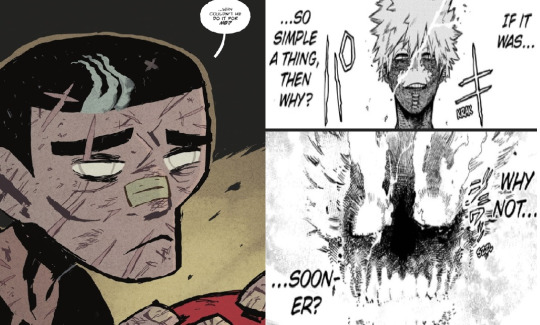
"You haven't been here long but you've seen him, right? The batman. The batman. He lives in darkness, to find the helpless and bring them into the light. So I have to wonder...why couldn't he do it for me?"
The Boy Wonder: Issue #2
This is the story of the boy who didn't get saved. The story of a boy who really ought to have been saved. Of course, every victim deserves to be saved, but this boy was the son of a superhero. Can a hero who saves everyone, but fails to save his own son really be called a hero? As for the son, how does it feel to watch his father save complete strangers but let him fall to the wayside?
Jason Todd and Dabi are two characters with similar backstories and motives (so similar it's possible Dabi is outright based on Jason Todd) which are worthy of comparison. These are two tragic arcs which explore the conflict between a hero's responsibility to act as a father, and their responsibility to save people. As I said they are tragic because in both cases the hero fails, as a father, and a hero. However, I'm comparing the two because Jason Todd's story is a well written tragedy, and Toya's story is not.
If you were to write a story of my life, it would surely be a tragedy.
Aristotle's Poetics is the first attempt to define what Tragedy is, not as a story where sad things happen but a specific story structure. He outlines not only what makes tragedy, tragedy, but also what makes a good tragedy.
The Plot, then, is the first principle, and, as it were, the soul of a tragedy: Character holds the second place. A similar fact is seen in painting. The most beautiful colours, laid on confusedly, will not give as much pleasure as the chalk outline of a portrait. Thus Tragedy is the imitation of an action, and of the agents mainly with a view to the action.
I use this quote because the painting metaphor is a great way of explaining what I'm getting at, you can have a painting with the most wonderful colors, you can have a story with really good ideas like the Todoroki family plotline but if you don't use those colors correctly all you're going to end up with is a bad painting.
In poetics Aristotle clearly defines a tight well-structured plot as the first priority for effective tragedy, character as second.
Again, a beautiful object, whether it be a living organism or any whole composed of parts, must not only have an orderly arrangement of parts, but must also be of a certain magnitude; for beauty depends on magnitude and order. Hence a very small animal organism cannot be beautiful; for the view of it is confused, the object being seen in an almost imperceptible moment of time. Nor, again, can one of vast size be beautiful; for as the eye cannot take it all in at once, the unity and sense of the whole is lost for the spectator; as for instance if there were one a thousand miles long
To make sure you understand, it's vital in tragedy for all the pieces to fit together. Tragedy is a specific story format. Good tragedy uses the parts of a story well, but bad tragedy is sloppy and poorly put together. In tragedy, the whole has to be greater than the sum of its parts. The Todoroki Family are all good characters out of context, but the story could have enhanced their characters but detracted from them due to how poorly it is told. The fact that a lot of MHA fans are in love with the Todoroki family out of the context of the story, but also have constant complaints for how Horikoshi handles their plotlines is, in my opinion, very telling.
What Aristotle goes on to posit is the best tragedies do not come about by accident, but rather by the direct actions of the characters.
But again, Tragedy is an imitation not only of a complete action, but of events inspiring fear or pity. Such an effect is best produced when the events come on us by surprise; and the effect is heightened when, at the same time, they follow as cause and effect. The tragic wonder will thee be greater than if they happened of themselves or by accident; for even coincidences are most striking when they have an air of design.
Therefore Tragedies require consequentialism, like Newton's Third Law, every action will have an equal and opposite reaction. To simplify a good tragedy arises from the consequences of the character's actions (or inaction). The most basic form is that the hero of the story will have a tragic flaw that they fail to improve upon in time and then leads to their destruction. In essence, tragedy is where the hero fails. Not only does the hero fail, but the hero loses, and that irreversible loss is what defines tragedy. Medea slays her own children, Oedipus rips his own eyes off and deserts his kingdom, Creon Antigone is buried alive and Creon's son, her fiancee, commits suicide.
These events share two things in common, they are irreversible (hence why they feel like good endings), and two they evoke catharsis. Aristotle defines the goal of tragedy to evoke terror and pity. We feel alongside these heroes, Medea was abandoned by the husband Jason who she left her home and slaughtered her own brother for, Oedipus did all of his crimes unwittingly and is a victim of fate, Antigone was doing the right thing by burying her brother so his soul could pass on to the afterlife.
There's all different sorts of tragedies, Hamliet explores more here. I'd say UTRH and Hellish Todoroki Family are tragedies centered around grief.
Tragedy works on extreme emotions, and extreme hard-hitting consequences to the hero's failures. The worst thing a tragedy can be is boring.
The Tragic Hero
Now that I'm done lecturing you let's actually talk about both My Hero Academia and Batman like I promised. Both of these stories don't actually feature the central victim as their protagonist, and that is a feature not a flaw.
Rather, the story we are being told is that of a tragic hero, failing to save a tragic victim because of their own personal flaws.
These flaws are called (hamartia) or "error in judgement". A hero, being called a hero of a story is often unaware of his flaws which is central to what makes them unable to fix those flaws in time. That flaw can later lead to a moral failing, such as Othello's jealousy, initially jealousy is an understandable emotion, but then it leads to him trusting Iago over his own wife and killing his wife in a rage.
Most importantly, the hero’s suffering and its far-reaching reverberations are far out of proportion to his flaw.
Let's begin with talking of the heroes and their flaws, Batman and Endeavor. My main reason for comparing these two is in these specific stories they have the same flaw, inability to move past their personal guilt towards their son, and the same conflict the duty of a father versus the duty of a hero.
However, Batman functions as a tragic hero, and Enji does not. The summary of their conflict is right here in these two panels.
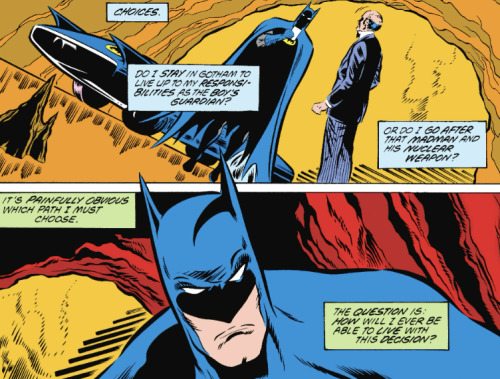
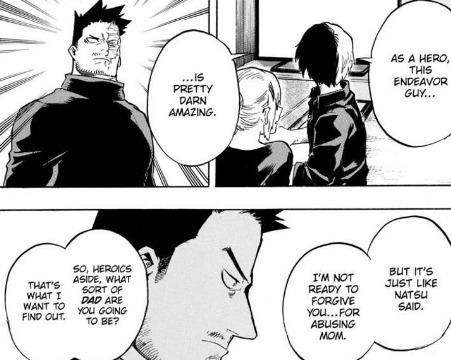
A parent is required to place their children above everything else, because they are the ones responsible for bringing that child into the world. Bruce Wayne made the decision to adopt Jason. Enji made the decision to have children, however with Enji you have the added insidious motivation of he only wanted to make designer babies and just didn't care for the ones who didn't turn out right.
Bruce attempts to do both, to act as a father for Jason and also a crime fighter as batman but he can't do both. This comes to a head in Death of the Family when Jason is having serious trouble because of his lack of a strong parental figure, and Bruce knowing that Jason is in trouble chooses still to go off and fight crime instead of staying with him. The choice to place crimefighting over the child they chose to take responsibility for has the unintended consequence of getting that child killed.
Whereas Enji makes the same choice over and over again, ignoring Toya's clear troubles at the fact his father no longer spends time with him and choosing to run away to the world of heroes because he doesn't want to face the fact that his actions are severely hurting his son. Bruce's motivations are more sympathetic admittedly he wasn't actively practicing eugenics, but the choice is the same and the consequences are the same.
Both Bruce and Enji are forced to bear witness to the deaths of their children when they are not there, specifically because they made a choice to be a hero instead of staying by their child's side. A situation directly caused by their choice to be a hero over a father, and a situation that would have been avoided if they had stayed with their child in their time of need. Jason runs off when Batman tells him to stay and gets kidnapped by the Joker, if Enji had been on Sekoto peak that day Toya would never have accidentally lost control of his fire.
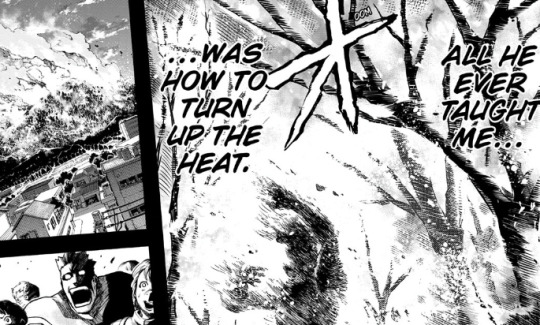
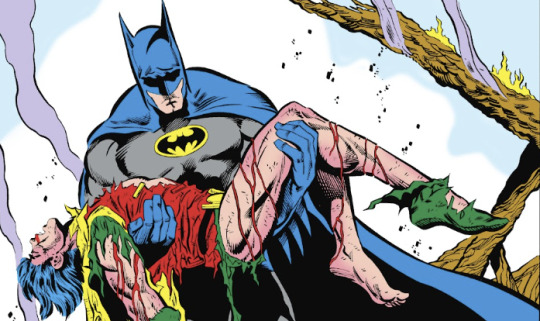
This is just the backstory however, the main event that kickstart this plot is the unexpected return from the dead of both Jason and Dabi. Each story follows the same plot beats. A new villain appears to challenge Endeavor / Batman. The villain reveals themselves as their dead son. Both Endeavor / Batman are given a chance to try reaching out to their sons, but they choose not to.
Then even though they are given a second chance with a miracle of a dead son coming back to them, they choose the exact same thing they chose before, being a hero and because of that the tragedy repeats itself. For both of them they are unable to save their son again, and the son goes through a second death. History repeats itself, the lesson isn't learned.
Their fatal flaw is their guilt. This is a story about grief and mourning after all, a son who is died, buried, but never grieved properly, never mourned, an open wound on the father suddenly coming back. The inability of each to process their grief blinds them from seeing the fact the son has come back, and they have a second chance.
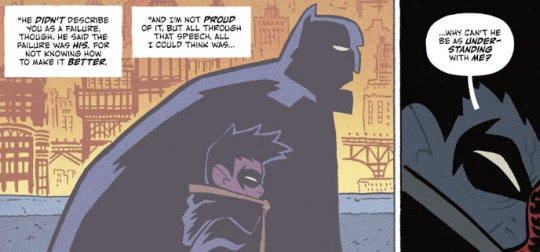
Toya has internalized he is a failure, because Enji literally called him that. Jason believes that Batman thinks he is a failure. In both cases the father is the one who failed, Bruce at least acknowledges this but cannot communicate it in any way shape or form.
This guilt and responsibility both Enji and Bruce feel causes them to self-sabotage. They no longer have the confidence they are in the right (they no longer feel like heroes because they have failed to be heroes to their own son).
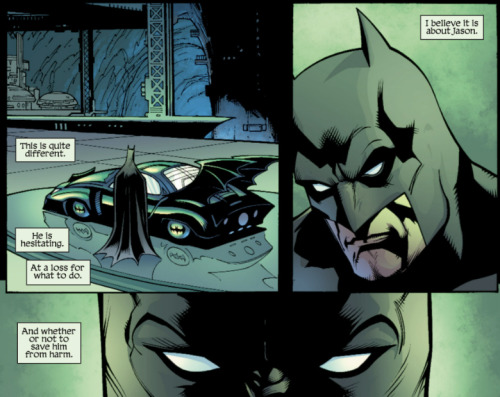
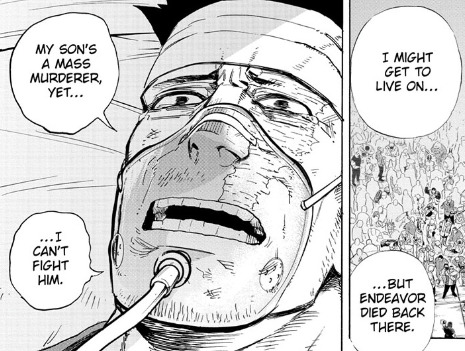
You can also add the layer of complication that since both men chose to be heroes in the past, they do not know how to handle the situation as a father now that they're being challenged to step up as one. Unfortunately, they are not the fathers that stepped up.
The reason their grief becomes a flaw is because they put their grief over their victims. . Each man is aware too much of their own failure, and while they should feel guilty they make the classic mistake of placing their own guilt over the feelings of the victim. The guilt they feel for causing the death and the genuine grief of losing a son is given priority over Jason and Dabi who you know... actually died.
An overwhelming grief and guilt is understandable because grief is a messy and human emotion, losing a child is an unimaginable tragedy that should never be inflicted on anyone.
Yet at the same time both Dabi and Jason are grieving to. This paradox that Batman only thinks of his own grief at losing a son and never stops to think about how Jason must feel leads to one of the best lines in Under the Red Hood.
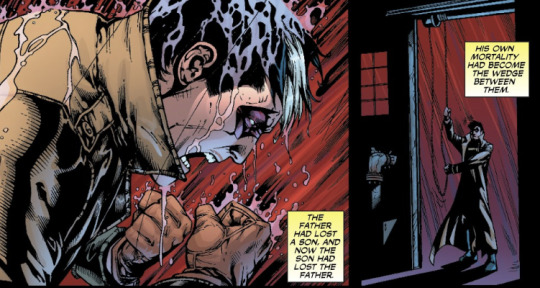
"The father had lost a son, and now the son had lost a father."
Batman's guilt is so strong over being the cause of Jason's suffering, that the suffering of the victim himself is ignored. To be fair to My Hero Academia, the Todorokis say a similar line to Enji.
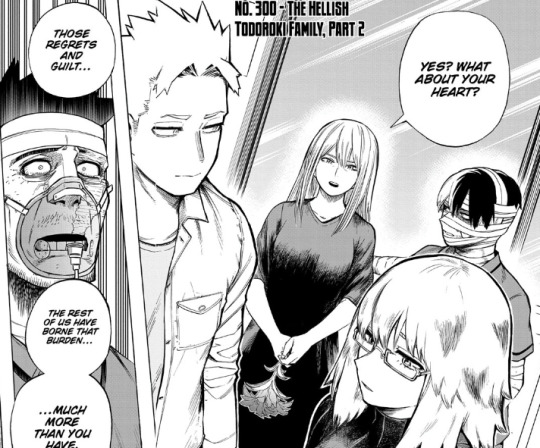
However, this is where I begin to get into the difference between ideas and execution. Tragedies are stories of actions and logical consequences, every action has an equal and opposite reaction in Under the Red Hood. Batman is punished for the choices he makes, the choices he doesn't make, and the choices he fails to make in time.
The Todoroki plotline features almost none of its character making any choices of substance, and because of that the plotline says the right things over and over again, but it all comes off as tell don't show.
I'm going to quote @codenamesazanka's post right here a couple of times because they describe the complete failure of the Todoroki plotline to show us a reason why we should be feeling things for the characters artfully.
We've heard Enji say this before - I'm sorry, I intend to atone. It's indeed the right thing to say, it's exactly what he should be saying and acting. Natsuo is declaring no contact - That's fine, I'm sorry, I accept this as part of my atonement and will continue. Touya calls him a coward - That's fine, I'm sorry, I accept this as part of my atonement and will continue. The public hates him - That's fine, I'm sorry, I accept this as part of my atonement and will continue.
But you can only hear this so many times before you want to snap and beat the character, the story, the writing over the head with Enji's wheelchair. Why is that? He's behaving exactly as he should, and yet...
The reason why it fails to evoke strong feelings is because of what we'd called "narrative dissonance." The actions of Bruce and Enji are the same, they both neglect to do anything, make any real attempts to reach out to their victims because they're paralyzed by guilt.
However, we are told that they have entirely different arcs. Bruce's arc is a tragic fall. He's failing as a hero. While we are being told that Enji is experiencing an arc of atonement. Enji is supposed to be improving himself, and Bruce is supposed to be experiencing negative character development but they both do the exact same thing in story. Bruce neglects Jason, we are told by the story, by the characters in the story that Bruce is failing Jason. Enji does nothing in time to actually atone for Toya or try to help him, yet, we are told again, and again, and again, and again, and again, and again that Enji is atoning with nothing substantive to show us this is the case.
To show what I meant instead of telling this scene is in chapter 252.
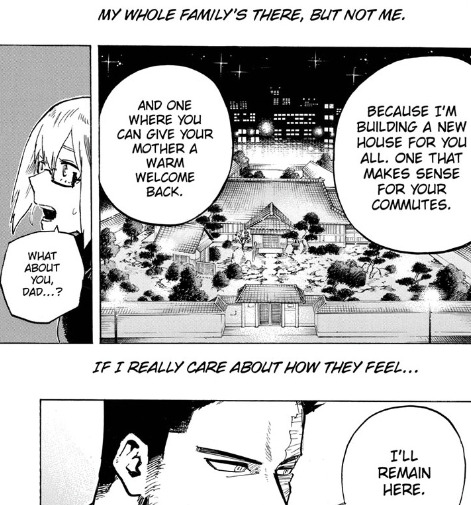
This scene is the ending point in chapter in chapter #426.
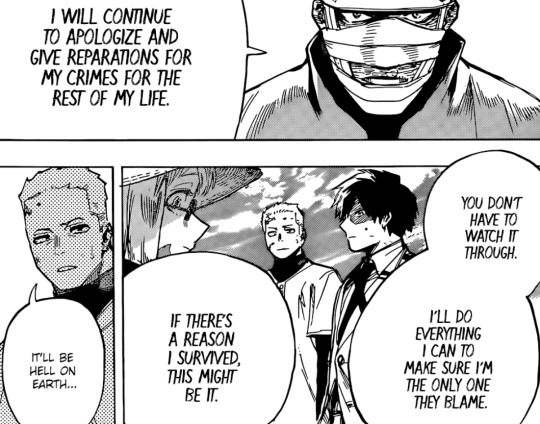
It's just him repeating the exact same sentiment and yet in a more than 150+ chapter gap, Enji never made any action to show he was now placing his family first. Enji didn't say anything to Dabi when he revealed himself as Toya. Enji didn't look for Toya in the months before the final war arc. Enji literally appeared on live TV in a broadcast that Toya was watching and said the very selfish "Watch Me" atone for the crime of creating Toya instead of literally talking about Toya or too Toya. Well, that would have rocked the boat too much... THAT IS LITERALLY THE POINT. Enji had to somehow break from tradition or make some significant sacrifice onscreen to his social standing to show that he's willing to put his family first. Enji decides to go along with Hawks decision to not face Toya head on, making the decision to be the hero for the final time which directly causes Toya to get up after Shoto brings him down non-lethally and make one last attempt to suicide bomb for his father's inaction.
Bruce does nothing for a long time in Under the Red Hood. He ignores his initial instinct that Jason came back and instead makes a long investigation on whether or not someone can come back from the dead in order to distract himself. When Jason takes the mask off, Batman already knew but was pretending otherwise because he didn't want to face the reality.
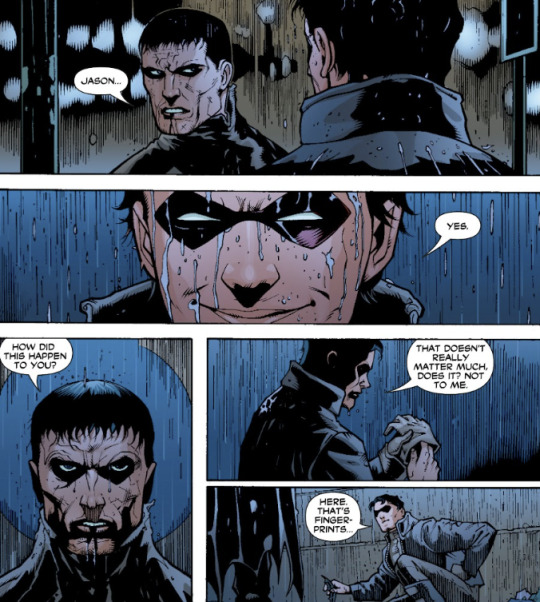
Even when Jason takes his mask off, Bruce still takes on the "I need to investigate this" angle even though Jason calls him out that deep down he already knows it's the truth. This of course foreshadows Bruce's underlying flaw, he doesn't want to face Jason head on because he feels too much grief about what happened to Jason and his guilt is more important than Jason's own grief. Just as the father has lost the son, the son has lost the father.
What follows is several chapters of Batman fighting crime as usual and making no attempts to directly search for Jason. They cross paths a few times but when they do Bruce doesn't follow. In fact, Bruce only shows up when Jason sends Bruce a sample of the joker's hair and Bruce knows that the Joker has kidnapped him out of Arkham. Bruce almost lets Jason get killed by Black Mask because he doesn't know whether to stop Jason or save him yet again, and then they have their final showdown where Jason has kidnapped the joker to demand Bruce kill him, and Bruce finally attempts to talk him down.
Out of context it sounds like I'm describing the same plotline, to the point where if you haven't read either, it looks like I'm complaining baselessly. Why is one hero doing nothing until it's too late good, and the other bad? The difference is of course context, or rather framing. Bruce's actions are called out by the people around him (Dick, Jason, Alfred) as him handling the situation wrong. Whereas both Enji's internal monologue and other characters say that he is doing his best to atone for his actions and deserves a chance, but the events we are shown in story are the exact opposite.
Here's another example to SHOW my point. Here's Dabi with my special, hardcover edition of under the Red Hood.
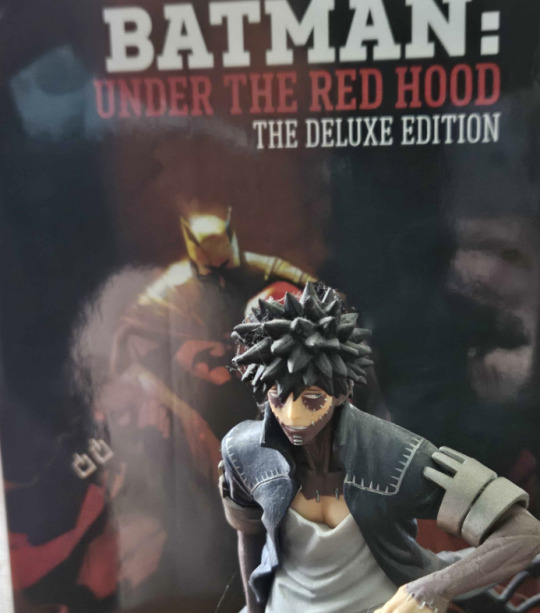
I reread the entirety of the fourteen chapter plotline and the majority of internal narrations come from characters outside of Bruce observing his behavior and commenting on how differently he's acting. Jason's backstory for instance is told by Alfred, not Bruce. Dick Grayson the first Robin comments on Batman's odd behavior. The rest are the third person narrator. Bruce has four instances of internal monologues spanning a few pages each in a 378 page story. (Alfred has the most internal monologues and he's presented as a more trustworthy unbiased narrator than Bruce, to get us to question Bruce's actions).
"Information travels on many routes, sometimes it comes predictably like the tides. You just need to know where to stand and meet it. Other times it's elusive and you have to root through the garbage to find it. In the last few years I've come to rely on Barbara Gordon, Oracle, we all did. Utilizing every form of surveillance equipment she has been the eyes and ear [...] but those days are over. I can't rely on anyone anymore. [...] and tonight it's also about the company I keep. It's different with him [night wing] out here. I think about when he was younger, when I was younger, it was different, simpler and I miss it. I miss those days, for that it's hard to be around him.
This first internal monologue is a case of unreliable narrator, because as soon as finishing it Dick Grayson / Nightwing shows up, offers Batman his help and while Bruce at first refuses it the two of them are forced to work together to fight Amazo. What does this show us? Bruce is not alone, but Bruce actively acts like he's alone ignoring the feelings of the other people around him. It exhibits a flaw of Bruce and the bad headspace he is in mentally (if I remember correctly Stephanie Brown recently died in the comics while this storyline was being published. It establishes Bruce's improper coping mechanism with grief, and how he is going about it the incorrect way.
Bruce says I work alone, and then Bruce says it's easier working with Dick, I miss it, but I can't go back to those days. It's bruce's contradictory thinking patterns in the same chapter that stop him. it's bruce's fault he cannot connect to Dick, and he is actively mourning the past because his relationship with Dick has changed.
Now the final part of the monologue in that chapter.
He's quick. Not just fast, agile. He's not thinking about his next move, he's just making it. He's been trained well. And there's something about him. Something familiar. There was something interesting about before he cut the line, before it had been taught. That had to have been practiced. Either that or just plain dumb luck. No it's not luck.
This is the first hint that Bruce already suspects it's Jason from early on but is in denial about it. This unreliable narrator trope also gives an agency to Bruce's decision, he is actively choosing to ignore the possibility that it's Jason because it doesn't want it to be.
Whereas, a lot of Endeavor's plot takes away any agency from him. For example, he doesn't even know that Dabi is Toya, because if he had the sneaking suspicion and ignored it like Batman did that might have made him look bad. We can't have the main character in a tragedy looking bad now can we?
The second monologue is more denial.
That device is from Kord industries. I should know. Ordered it special from them. How can he have it? No more dead ends. No more questions. No more guessing. Tonight I find out what is passing for the truth.
Reading between the lines this is outright confirmation Batman already knows.
The third is a brief reflection in his feelings for Jason.
The armor has to be light enough to fit but strong enough to protect. But sometimes a great many times, it's not strong enough. It wans't strong enough for Barbara who has to fight from her chair. It wasn't strong enough for Stephanie, other dear soldier enough dear grave. And it wasn't enough for Jason. Willful Jason. Who ignored the danger. Who spat at risk. Who was never frightened enough. I've always wondered... always... was he scared at the end? Was he praying I'd come save him? And in those last moments when he knew that I wouldn't. Did he hate me for it?
This monologue directly shows without stating it outright, Bruce is prioritizing his feelings of grief and failure mixing them in with his genuine grief over the loss of a son. it's selfish of him, but grief is a selfish emotion.
Here's the thing Bruce is allowed to be selfish and to not have the correct reaction to his grief, because the whole story is centered on Bruce being unable to get his shit together in time, and this picture into his emotions is an explanation as to why. Bruce is afraid of being hated by Jason. Jason of course has every right to hate him for failing as a father, but still I think not wanting to be hated to a person you loved so much and feel genuinely sorry over what you let happen to them is an understandable reaction.
Meanwhile we have Enji saying repeatedly all the right things in his monologue, the selfless, I don't need to be forgiven, it's okay if they hate me, I just need to atone but he never actually does anything. There's no explanation for why he isn't doing anything either, so that narrative dissonance. We're shown why Bruce doesn't act in time, he's internally a mess to be frank. We are not shown why Enji doesn't act in time because his internal monologue tells us again and again he's committed to atoning and he understands what the right thing to do is.
As Codenamesanzanka says:
Enji is still saying all the right things, but the story isn't giving him the opportunity to actually do the right things. To have his new actions matter. I have no doubt about his sincerity in his mantra, but without the 'show', it's hollow.
Similarly, "Let's talk" is actually kinda bullshit too, because it's so vague. This is less about Enji, and more about the writing, how it set up this scene. "Let's talk" or "I want to talk" or any of that variation is repeated 6 times, without anything more or specific added.
There's an excess of repetition of Enji saying he wants to atone, he's ready to atone, without any of that materializing in the story.
As @class1akids says in this reaction post:
It also feels also super-hollow to say he's sheltering the family from the fallout, after they've just talked about how Fuyumi lost her job (and got a new one through the connections she herself built). How is he going to do that?
The fourth because I don't want to write it down, it's just Batman monologueing on how his partnership with Jason is still good and explaining the technical details of his fight with count Vertigo. It's in chapter 10 if you must look it up.
So four monologues total. Two monologues establish indirectly that Batman knows that Red Hood is Jason and doesn't want to face him. The third monologue establishes why he doesn't want to face him, he's afraid of being hated. The monologue is in line with Bruce's actions in the story, Bruce investigates several ways of reviving from the dead instead of looking for Jason.
The character's reactions around Bruce are also talking about how he's not acting like himself. Especially Alfred's who speaks of Bruce's indecision, on whether to put a stop to or save Jason.
"It is curious. He is lost in thought. It is not like him to spend vast stretches of time immobile, where his mind is gripped in the solitary process of deduction. This is quite different. He is hesitating. At a loss for what to do. I believe it is about Jason. And whether or not to stop him or save him."
This is illustrated in two scenes later where Jason spends a long time simply watching when Jason is fighting enemies, first in a fight against Captain Nazi, and second Black Mask. Jason even gives a direct callout of that behavior.
Jason: What the hell took you so long? Couldn't decide if you wanted to let me live.
Batman: Shut up and fight.
Observed by Alfred Bruce is completely stalling and can't choose, observed by Jason Bruce can't decide whether to let Jason live or not. Bruce hesitates twice. We know why. We see it in action. It's called out as flawed behavior.
Now let's cover all the tell that don't show that is Endeavor's many monologues.
Pro Hero Arc:
I have to safeguard the future for them. That's the job for whoever's on top. What about the lives I cut short? Just demanding forgiveness isn't enough, it's too late for that. At this point I need to atone there's no other route.
Hellish Todoroki Family 1:
I'm trying to make ammends going forward. It might be too late. but I fall asleep every night thinking about it. Lately it's been the same dream. The wife and the kids looking happy at the dinner table. But I'm never there with them. It might be too late but I fall asleep every night thinking about what I can do for my family. I wish you could be here too, Toya.
It's always the same dream. My whole family's there but not me. If I really care how they feel [I'll remain here].
I'm not going to read 200 chapters so I'm just going to ballpark it based on memory. Here we go.
Dabi's Dance:
My eldest, Toya didn't harbor frost within him. He didn't have a way to overcome the inescapable downside of overheating but I nevertheless sought to raise the boy as a hero. [...] Because Toya had more potential than me I placed my ambitions on his shoulders. I thought it could be you. You could have been the one to reach my eternal goal. My frustration... My envy... The ugliness in my heart... you could have been the one to smash it all to dust.
Plot twist this is the only monologue I like. It's different from all the others, and it's the only one where Enji is being emotionally honest. He put the emotional burden of his own emotional insecurities on an eight year old child, and expected to live vicariously through him and when Toya failed to live up to those expectations he just abandoned him. It alligns what we have been shown so far, Enji is not acting like a reptentant man here who realizes the harm he's done to Toya and only thinks of Toya as an extension of himself and his own regrets.
The Fight Against AFO:
My mistakes took the form as Toya leading to many stolen futures. The past never dies. Rage, resentment and even penace wound together toward the future. And the future is a path for the young. A path with so many branching choices. That's why I must win this. [I'll keep paying my penance. I'll win today and keep my eyes on Toya.]
When Enji decides to double Suicide with Toya:
I take full responsibility. I swore to bear the burden and live my life atoning for it all. However, you've been watching me all this time. While I couldn't be there to watch you. You were someone I especially needed to do right by. No I can't let you meet your end alone, but I won't let anyone else get caught up in our tragedy.
Hellish Todoroki Family Final:
I came to talk about what's to come. I'm retiring as a hero. That was my initial plan even before the war started, but now I can't even walk on my own. The hero endeavor burned to death. Your flames were really stronger than mine. [...] You're right. You know everything about me, Toya. After all you were always watching me. And you wanted me to do the same for you, but I didn't. Not matter what anyone says your heat does come from my hellflame. From now on I'll come everyday, so let's talk. It's too late now, so let's talk. [...] You're free to hate me. Anything is fine really, so throw it all at me.
This one is spoken dialogue but it's still a four-page long monologue. Every one of Enji's monologues with one exceptionsays the same thing: I'm sorry, I'll spend the rest of my life atoning for my actions.
We're repeatedly told Enji is atoning but he acts like Batman. Then, his actions should be framed as Batman, not atoning but avoiding any responsibility.
As observed by Class1akids when we were discussing the update:
Everyone else faces an uphill struggle with their lives, but we should all feel sorry for Enji atoning and being in hell. I hate Hori's compulsion to over-write his abusers and over-explain their atonement. He does this with Bakugou too but with Enji it's more irritating. It was so much more enjoyable when he just wrote the thing but didn't point at them and say -> look, they are atoning. Aren't they soooo cool??
Enji's internal monologues and the other characters frame him as some sort of martyr, while on the other hand it's clear by both Batman's actions and Alfred's observations he's not acting like his usual self. In fact, this is an interpretation of Under the Red Hood that I love from the writers of the video game Arkham Knight that does a less tragic retelling of Under the Red Hood:
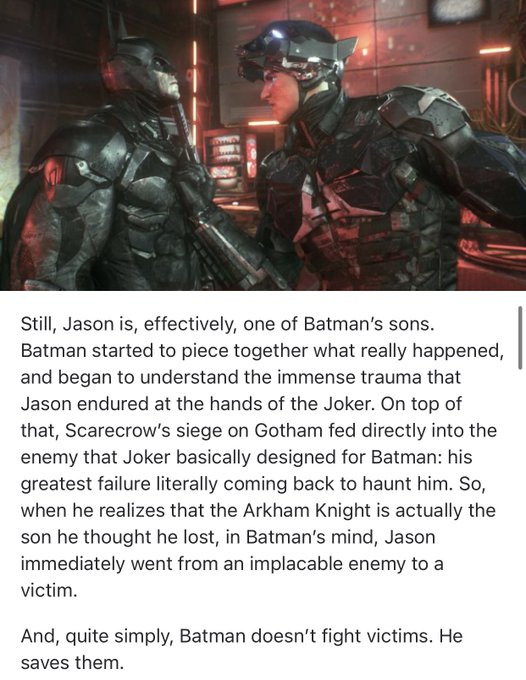
Batman doesn't fight victims. He saves them.
Therefore if Batman is fighting Jason, a victim, he's not acting like Batman. I'm also fine with Arkham Knight being an Under the Red Hood retelling because it's a different story. Comics do this all the time, different universe versions, popular storylines adapted into different mediums. It also works as a commentary on the original story, by showing what Batman could have done to lead to a more positive outcome it makes Batman's choices in Under the Red Hood worse and more tragic because he could have saved Jason, there was still a chance.
So here we have two flawed tragic heroes who are meant to be both pitied and condemned for their actions. One of them is all pity with no condemnation. The other is both pity and condemnation, Batman is grieving, but also he's failing his responsibility towards Jason. Therefore one protagonist works, the other fails utterly.
I'm not saying abusers don't deserve redemption. I'm not saying Enji should have died in order to atone. I'm not saying that the underlying problem with the arc is that they decided to make Enji sympathetic and a focus of the arc. The most important problem is the breaking of one of the fundamental rules of storytelling: Show, Don't Tell.
The Tragic Villain
Not only does The Hellish Todoroki Family plotline fail to make Enji a compelling protagonist, it also fails it's biggest victim. Now, these are both stories that end with the hero failing to save their victim. So if both of these stories have the same ending, why am I saying it failed Dabi, but not Jason?
Well, let me explain.
Dabi and Jason are both villains turned victims. The stories themselves are about this ambiguity. How much should the be held responsible for their own choices? If they are actively harming innocent people, then shouldn't they be stopped? Should they be automatically be forgiven just because of the pain and grief they've suffered, even if they've been causing it to others?
Both characters are also reflective of their fathers because they are too being selfish in their grief, they want their grief acknowledged and so are violently lashing out.
Jason and Dabi both make plays at being vigilantes at first, Dabi wants to inherit Stains will, and Jason Todd wants to be a better bat-man by taking control of the drug trade in Gotham and cutting crime down by executing gang heads. However, neither of them are being honest with this and it's shown through their actions, both of them abandon their original plans.
In the final showdown all Toya cares about is facing Enji on the battlefield, and when he's on the brink of death his mind erodes to the point where all he can do is scream for Enji's attention while his flames get hotter and hotter.
Let's take about Jason first and how his narrative treats him a whole lot better and more sympathetically, with more humanity than Batman. Jason is still held responsible for his choices, he is criticized by Bruce for murdering gang leaders and passing it off as justice. He's also blatantly shown to be a hypocrite. My favorite scene from Red Hood: Lost Days, the official UTRH prequel.
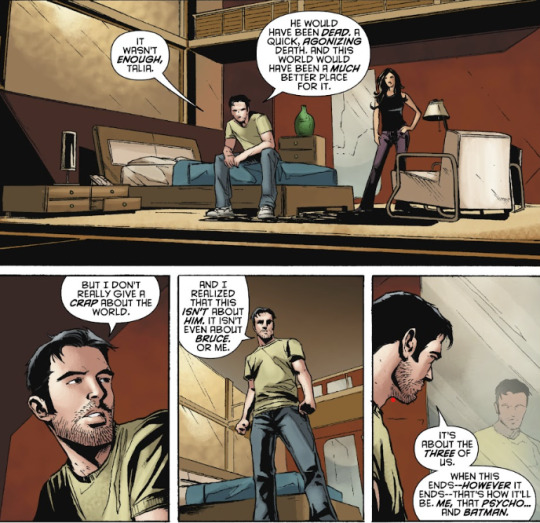
"I want to kill the joker in a cool way. Just sniping the Joker from a rooftop isn't dramatic enough for me."
This scene, and the final scene of UTRH underlines Jason isn't executing criminals because he believes it's the right thing to do, or because of his stated motivation that killing the joker would prevent more future victims.
Instead his every action is to set up a scenario where he makes a selfish demand of Bruce. He wants Bruce to prove to him that he would choose him over being a hero, by setting up his final scenario. Him, the Joker, and Batman. Jason will shoot the Joker. Bruce has a gun. He can either choose to let Jason kill the Joker, or kill Jason to stop him, either way it makes it clear what Bruce's priorities are.
The underlying reason for this is similiar to Bruce. Just like Bruce, Jason is deeply afraid that Batman doesn't love him. That he thinks of him as a failure. (This is Toya's main reason too).
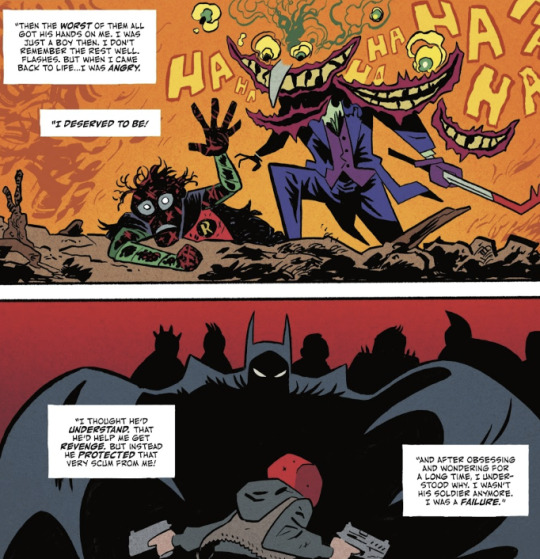
He also interprets Bruce's failure to avenge him to mean that Bruce didn't even care enough to mourn him. If Bruce loved him enough, he'd choose him over the joker, but he's so afraid that Bruce doesn't love him enough that he's going to force Bruce to choose.
Along the way he's also going to behead several crimelords in order to put an exclamation point on that point.
The way Jason completely unravels in the confrontation shows this insecurity, he begins with monologueing about how batman should totally kill people, until his fear that he wasn't important enough, and his grief at losing his father is revealed.
Batman: I know I failed you, but I tried to save you. I'm trying to save you now.
Jason: Is that what what you think this is about? Your letting me die. I don't know what clouds your judgement worse, your guilt or your antiquated sense of morality. Bruce, I forgive you for not saving me.
Jason: But why on god's green earth is he still alive? Ignoring what he's done in the past. Blindly, stupidly disregarding the whole graveyards he's filled with people. The friend's he's killed. I thought killing me - that I'd be the last person you ever let him hurt.
Jason: If it had been you that he beat to a bloody mess. If it had been you he left in agony. If he had taken you from this world. I would have done nothing but search the planet for this pathetic pile of evil, this death worshipping garbage, and sent him off to hell.
Direct statement, it's irresponsible of Bruce to let Joker live after killing Jason and should have put him down to prevent future victims. Reading between the lines, Batman not taking revenge for Jason is a sign that he didn't love him enough, Jason loves Batman more because he would have taken revenge.
As the confrontation continues and Jason's mental spiral worsens, to the point where he can't keep up his pretense of self-righteousness.
Jason: I'm not talking about killing cobblepot, or scarecrow, or riddled, or dent.
Jason: I'm talking about him. Just him. And doing it because...he took me away from you.
The father had lost the son, and now the son had lost the father.
Jason's revenge is just a cover, for his grief at losing Bruce. I think this also shows a really positive aspect of Jason's character to humanize him instead of condemning him for his actions to ignore or even justify the suffering he endured: Jason really loves Bruce.
I mean how meaningful is the statement: "Bruce, I forgive you for not saving me."
Bruce has been afraid to hear the whole time that Jason hates him, that he won't forgive him, but Jason loves him deeply. In fact his love is almost equal to his rage because Jason is a deeply emotional person, and these little details make him human and not just like a plot obstacle that Bruce has to face. A metaphor for his past failures.
Dabi is drawn as a crying boy who wants comfort, Jason is shown to be a crying boy who wants comfort through both dialogue and action without us directly needing to be told. It's a heartbreaking line and doing it because he took me away from you and it lands perfectly because the narrative wants us to just look at Jason's grief. It doesn't add an asterisk* even though he was in pain, he's done unforgivable things that can't be justified to undercut Jason's suffering.
In fact that might be another underlying problem with The Hellish Todoroki Family, the narrative tries too hard to make you feel a certain way instead of just presenting things as they are to make you come to your own conclusion. UTRH doesn't support Jason's revenge based serial killing of villains. It doesn't say he's justified to cut off the heads of mobsters. However, it doesn't excessively state "Well, I'm really sorry what happened to you but what you've done can't be forgiven" so we don't have to challenge ourselves to feel too much empathy for Jason's suffering.
Meanwhile even when Toya tries to express his rightful anger and grief, we're always met with someone shutting him down and saying well yeah, but you're wrong, involving innocent people is unforgivable.
As said by @stillness-in-green in the replies to this post:
I think so much harm (in-universe, but the state of the Twitter fandom makes me think the messages are pretty toxic irl, too) comes out of portraying the Heroes as needing to weigh in on the *morality* of the Villains' actions before they gauge "saving" them, when that is not a thing that glorified cops have any business thinking they have the right to do. Demanding repentance before the rehab is so bizarre.
You can say someone's actions are wrong without using it as a factor to consider whether or not their suffering as a human being should be acknowledged, and like I said there's multiple instances of people just yelling at Toya how immoral he is instead of addressing the elephant in the room.
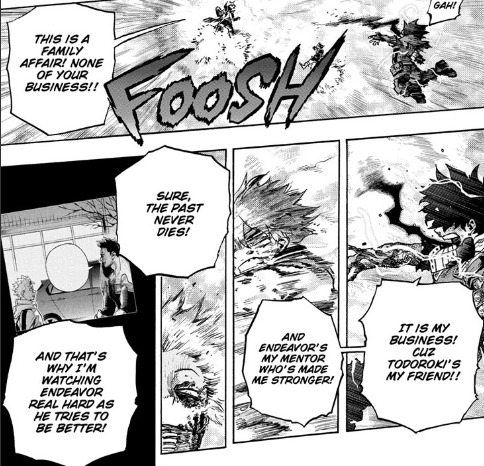
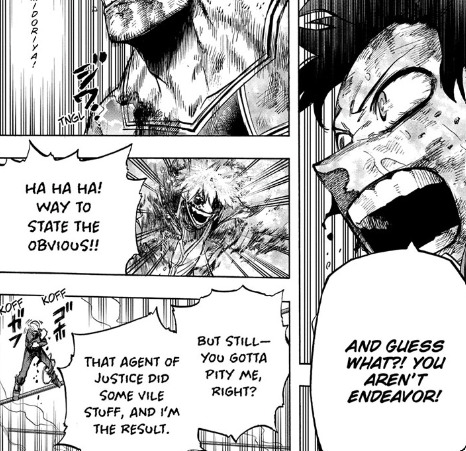
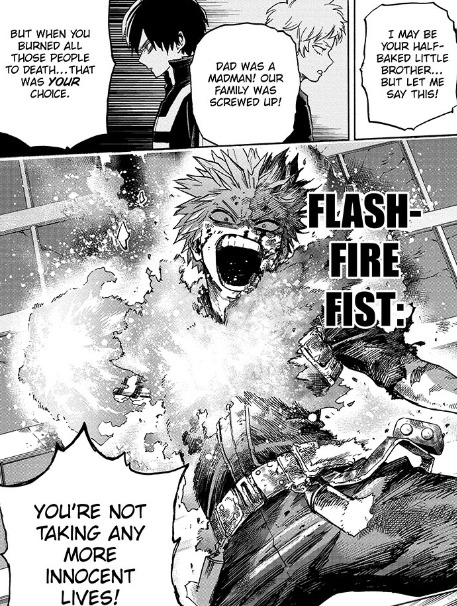
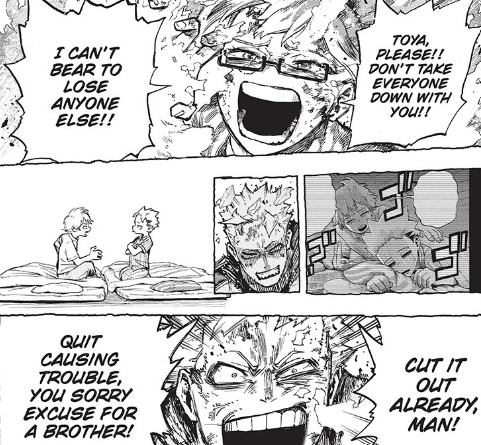
You're wrong, you're wrong, you're wrong, you're wrong.
(Okay, I understand that some people have interpreted this as a show of Honnae and Tatamae, the Todoroki's who are a very repressed household are finally talking about their feelings even if those feelings are selfish and ugly).
(I'm not criticizing Shoto for saying that the people he killed were his own choice necessarily, Shoto is a character who's actions need to be read more deeply than his words he was dedicated to bringing Dabi down without him burning himself any further start to finished. My criticism lies in the fact that Hori uses Shoto as a mouth piece because he thinks we need to be reminded that murder is bad).
However, even acknowledging that time and place man, time and place. They couldn't have done that in the aftermath, when Toya isn't burning to death?
Hey buddy, you're being selfish.
Toya: AHHHHHHHHHHHHHHH I'M MELTING, I'M MELTING.
This is I feel the underlying problem with the way the arc is written, not because the Todorokis are a very traditional Japanese family and there are cultural reasons they express their emotions differently, I'll give a caveat to that it's a nuance I might not understand.
However, I am arguing the actual problem is tell don't show. Horikoshi thinks that we as an audience need to be told multiple times that murder is bad, and we cannot be trusted to interpret that on our own.
Under the Red Hood shows both sides of Batman and Jason's debate, and let's us just come to the conclusion that Jason is in the wrong because revenge isn't justice. Horikoshi reaches no shit sherlock levels of telling us that we're not supposed to approve of Dabi's murders.
it's also a matter of giving Dabi narrative space to express his feelings, like every time Dabi tries to talk he is continually shut down (Shoto does engage Dabi talk to him and listen to why he didn't come back though I'll give him that) and it seems to be to push forward this weird idea that you shouldn't sympathize with the pain Dabi has endured or the ways he's dehumanized unless he does something to prove he deserves to be treated like a human being first.
Jason gets to monologue and make an entire argument, and his argument also shows the depths of his love for Bruce and what a deeply feeling person he is, and how those feelings being hurt and twisted could logically lead to his lashing out.
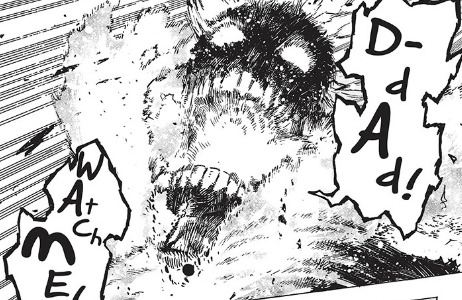
Compare this to Dabi who doesn't get a final monologue, but is instead reduced to a completely mindless state where he just cries out for his dad's attention. He doesn't get to make his argument.
Jason and Dabi both choose to blow themselves up, but Jason gets enough character agency to show this is a deliberate choice he's making even if it's the wrong one. He retains his character agency and ability to make decisions until the end of the narrative.

Jason's also you know physically crying. The end result of the narrative is about wrong choices that both Bruce and Jason make together, and then suffer the consequences together. Bruce watches the same failure play out again and he isn't able to save Jason, Jason doesn't get what he wants, he doesn't get revenge and he doesn't get to reunite with his father. It's tragic for both of them, and brought about by decisions both of them made.
Whereas yes Dabi makes a lot of bad decisions leading up to the last war arc, but in the end his final fate is up to a choice Enji made to not face Toya in the final battle.
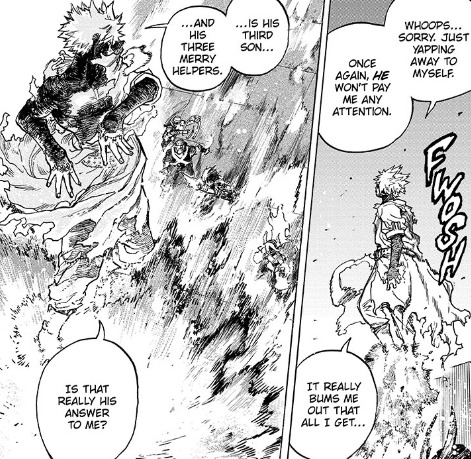
However, while the final consequence of the battle is brought about more by Enji's decisions than Toya's, it's Toya who endures all the suffering and punishment. It's Toya who is in an iron coffin, and doomed to slowly and agonizingly die with all of his skin burnt off unable to move. Toya doesn't even get agency after the arc is over. Enji still has a wheelchair, Enji can still move around, Enji's still fucking rich, he's not in prison for his actions, he as Rei wheeling him around.
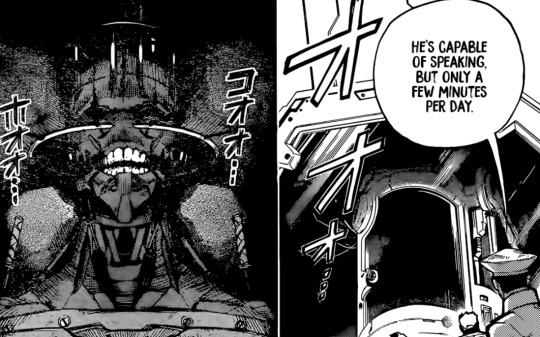
Toya's agency and choices are all taken from him, presumably to serve the plot purpose of making Enji save him to finish off his arc, and then ENJI DOESN'T EVEN SAVE HIM.
Also I think it's important to mention, Bruce's tragic ending is brought about by him attempting to save both, trying to save the joker and Jason with the same action. Whereas Enji's tragic ending is brought about by Enji NOT LIFTING A FUCKING FINGER TO HELP. Yet, it's Dabi who has the lion's share of suffering, and is sentenced to this horrific state of being skinless in an iron coffin and only being able to be awake a few minutes a day with no choice but to waste away.
Bruce is also immediately called out for his actions, by the Joker of all people, you handled this all wrong, it's your fault. Bruce is right to not kill the joker, killing the Joker would not have solved any of Jason's problems, but the fact that he put off facing Jason for so long, and his inability to communicate that he loves Jason is what leads to Jason thinking that the only way to prove Bruce loves him is to force him to choose. It's because Bruce has utterly failed to show him in any other way that he is loved.
Joker: Oh my god, I love it! You manage to find a way to win, and everyone still loses. I'm going to be the one who gets what he wants tonight, badda bing, badda boom."
I'd also like to add that a lot of agency in Enji's actions are taken away too, to make him look more blameless. It's not Enji's fault that he didn't say anything to Dabi during Dabi's dance, he passed out because he had a punctured lung. It's not Enji's fault that he spent a month protecting Deku instead of searching for Toya, he had to protect innocent people. It's not Enji's fault that he didn't go immediately to face Toya in the final war arc Hawks told him not to.
It's not Enji's fault that he made Shoto and Toya fight like Pokemon instead of cleaning up his own mess, and also he feels really sorry for it and as soon as he's done punching the bad guy he'll look after Toya he promises.
Enji does get called out for this behavior but it falls flat because it only comes from the villain AFO, and Toya himself. As I stated above too, the ending is more influenced by Enji's actions not Toya's (because Toya's agency is stripped away until he's mindless) but Toya is the one who has to die while Enji gets to live and atone.
That is the real sticking point for The Hellish Todoroki Family, the way it ends.
Themes Are For Eight Graders
The underlying problem with the whole arc and why The Hellish Todoroki Family fails as a tragedy, is because it wasn't written to be a tragedy.
The above quote is from an interview with the writers of the widely hated Game of Thrones Season 8, which took a sudden tragic turn for Dany's character, gave her an incredibly dehumanizing ending of being put down like a rabid dog by her own lover, an ending that was neither foreshadowed nor did it match with anything written before.
In this meta here by @hamliet it goes far more into depth that Game of Thrones isn't a tragedy, but a piece of Romantic fiction (not a love story, Romanticism is a genre of big emotions, the beauty of life, larger than life ideas hence why it fits well with fantasy genre, it can be sad but it doesn't follow tragic structure).
Dany is a romantic heroine, a deconstruction of the idea of the classic warrior princess trope, and you know a colonizer, but she's not meant to be written as an inherently bad person. There are people who say that Dany was going to die in the original books. I'm one of those people. Me. However, context and framing matters, Dany for all her colonizing ways does genuinely want to do the right thing, so it's likely she'd die a heroic death as a reflection of her selfless intentions (and intentions do matter for fictional characters) whereas in the show she's put down as a villain.
Now watch me I'm going to coin a term for future literary critics to use: Narrative Gaslighting.
Narrative gaslighting is different then Show Don't Tell, where an author has just failed to properly show what they're trying to tell you in the story. Narrative Gaslighting is when a narrative deliberately tries to mislead you, straight up lies to you, or just insists things that did not happen totally happened guys. Much like real gaslighting, Narrative Gaslighting makes you feel stupid for interpreting things a certain way and insists you were wrong all along.
Narrative gaslighting is when Tyrian gives a speech that everyone should have suspected Dany when she burned slavers alive that she was secretly evil and would one day turn on them.
Like, no.
Dany is flawed because she is a foreigner, interfering with the politics of a different country that she does not understand in order to gain enough resources and men to return to her home country and invade that country to exercise her right as a Targeryn to uphold the divine right of kings.
Game of Thrones doesn't mention any of that shit that's in alignment with the previous actions in the story, it's just insisting the very ableist notion that Dany was insane all along and her violence towards other people is the result of her mental illness.
(Also before anyone says, so if she's a colonizer than how can she have good intentions, everyone is Bad in Game of Thrones, they're all waging war to vie for a throne, monarchy is bad guys. IDK how to tell you that Game of Thrones has gray on gray on gray on gray morality).
(Also this aside ties into the hangup of MHA and most popular fandom culture on Twitter, that Dany's moral failings somehow disqualify her from her humanity. In spite of the fact that on top of all of that she's a rape victim, and like, Dany's only on that continent in the first place because she was sold as a bride.)
But here's the same weird subtext that Horikoshi's writing of Dabi. The fact that Dabi was continually victimized and denied human dignity does not need to be addressed, because he did the bad things and didn't atone properly enough for it first.
In essence this random post on the gunnerkrigg court forums I found on the same day the chapter came out, displaying apollo's gift of prophecy.
"When someone is persecuted, it's important to inform everyone about their flaws. That way you don't have to feel anything about all the times that they were denied human dignity."
So, Dany is not written as a tragic hero but a romantic one, we as an audience are both meant to acknowledge her flaws and sympathize with her, not demonize her in an ableist way for being insane, and even if Dany is meant to die the tragic way she dies does not match up with all of the narrative foreshadowing that was built before that.
Like, for instance a lot of POC after the show ended kept telling everyone that Dany's actions in a foreign country were seriously problematic, and not only did the audience not listen but the showwiters didn't acknowledge it with the same subtlety as the books. So those people especially were able to pick up Dany's character flaws, and when the show finally acknowledged them it's not even in the way that critiques of the show were pointing out Dany's flaws it was just "she was insane all along." Not like taking time to go "no matter what the intention, interfering with the politics of a foreign country is wrong."
The problem with the Todoroki arc is essentially the same, down to the ableism (because outsiders continually call Dabi either a maniac or insane Demon without even giving credence to his grievances about hero society he's just reduced to an insane fringe element of society, and Dabi himself is reduced to a completely mindless, childish, insane screaming state where he can't make active decisions).
The Todoroki Arc is not set up to us as a tragic one. The ending is pretty clearly telegraphed to the whole audience. People are not wrong for thinking that Toya's ending would be either rehabilitation like Rei with the eventual hope of being welcomed home, or some kind of house arrest where he still gets to be with his family.
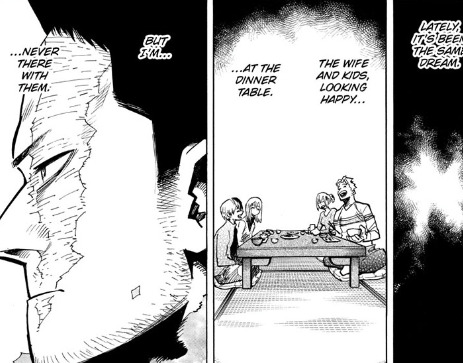
Everyone happy at the Dinner table and Enji not sitting with them.
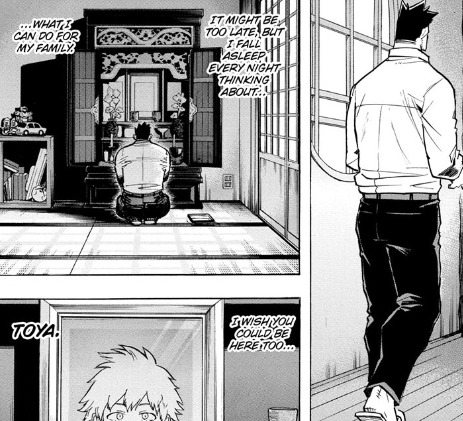
"I wish you could be here, Toya."
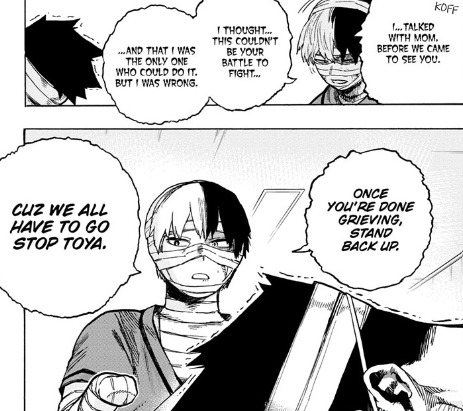
"We all have to go stop, Toya."
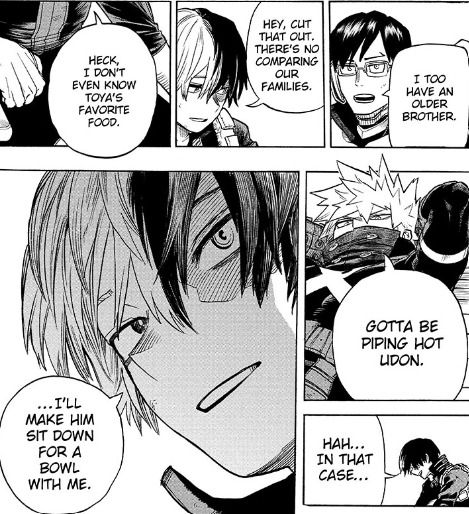
"In that case, I'll make him sit down for a bowl with me."
Even Shoto's efforts to take down Toya non-lethally are rendered completely pointless, because Toya gets back up again and then burns himself alive (completely by his own choice so no one has to feel bad that they failed).
The story sets up the expectation that Toya is going to be brought home and sit down for a meal with his family. Then it makes you feel stupid for going in an entirely different direction. It was always going to end this way didn't you know The Todorokis are a tragedy?
Well, I just spent a very long section of this thesis statement illustrating that if it's supposed to be a tragedy, then it's still not written well.
It's a written as a romantic story of a family healing, and the villain getting saved, only for the villain not to be saved and the story to just keep on going like not getting saved isn't a huge failure. This is something that should permanently destroy the main characters, that they got the chance to repeat Sekoto peak and be there this time and they all utterly failed. I feel bad for Shoto most of all because he did everything right, and he still loses his brother, but does the story show that?
The problem is the story is blatantly lying to you about the fact that Toya was somehow saved, even though he LITERALLY LOOKS LIKE HELLRAISER. To quote Codenamesanzanka again:
But I feel the story couldn't give us that because it will remind the reader and everyone just how much Touya will be missing. In-story, talking any more will overburden Touya's heart - and how apt is that metaphor? So let's talk about how we'll talk, but that's all that's allowed here for this scene. Else we'll see how unfair it is that Touya has to be confined to this room, he isn't with his family and they have to come to this prison just to tell him about their day, and soon he will be gone.
Details make it real, and it would've exposed the lie that Touya was saved in an actual way. The story knows it too - "this extra time Shouto gave us." This is all 'extra', and not the core.
[...]
If the story was sincere that this is a case of "it's simply too late" - as it should be!!! imo, to really drive in the clear point that they failed, they did not get the save they wanted, because that's the truth - the tone of the chapter isn't tragic enough for that. The tone is going for 'Making Peace With This'. We've skipped the stages of grief and all we have is acceptance. The characters have accepted this, and so must the readers as well.
Therefore it's narrative gaslighting, the story is making us doubt our perceptions and trying instead to manipulate us to feel a certain way. We don't have to question the unfairness of Toya's fate, because look at all the people he's hurt, and look how Enji is atoning and taking responsibility.
The story builds up the idea that Enji will choose Toya. That he will choose being a father over being a hero. Enji doesn't do that, and it's Toya who suffers the horrific, painful consequences while Enji gets off mostly scott free. Mind you it's also ableist to suggest that being in a wheelchair is some sort of life-ending consequence like he's fine. The story even goes out of its way to say how avoidable this ending could have been if Enji or Rei or someone lifted a single finger to give Toya the acknowledgement he wanted, and then gives it a "Too little, Too Late" conclusion but doesn't acknowledge that this is where it's ending and instead tells us that Enji has successfully atoned.
"Everyone's watching me. So this is what it's like. If it was such a simple thing, then why not sooner?"
If it was going to turn out this way Toya should have just died here, not because death would somehow be a mercy compared to life in prison, but because the Todoroki Family doesn't deserve to get to pat themselves on the back. If they let Sekoto Peak happen a second time, then they should have to deal with the consequences of that.
It would be consistent is my point. This is written as a "Too Little, Too Late" kind of ending, but we don't get the emotional response from the Todorokis that they've let Toya die a second time.
On the other hand, UTRH has the exact same tragic ending but it doesn't make me angry because it's honest about it. The Todorokis let Sekoto peak happen a second time. Batman let Death in the Family happen a second time, but look at how even the narration and comic panels of the story acknowledge it.
"Fate is a funny thing. It swells up like a raging current and we are forced to travel. It provides us no exit. No deviation. It drops us in a bottomless ocean and compels us. We either swim, or drown, and sometimes as we struggle against the tide, a great truth arises."
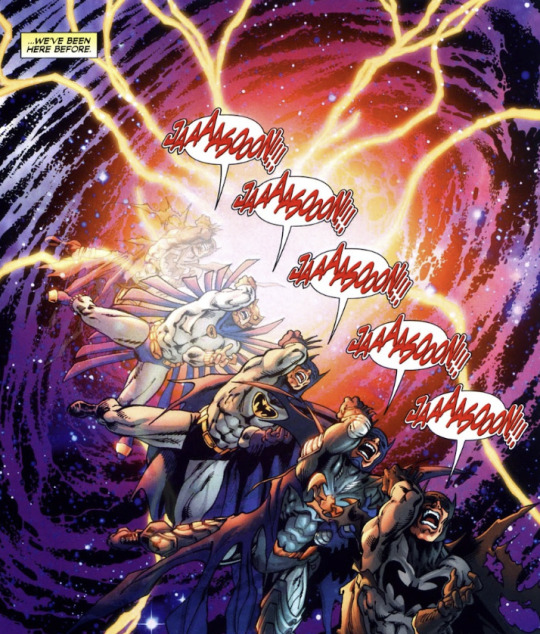
One ends with Enji meaninglessly stating that he'll spend the rest of his life atoning for Toya and watching over him (which I guess will be like two months tops) for the fifth time. The other ends with Batman being lectured by the Joker of all people of how he chose wrong and being forced to watch once again as a warehouse blows up, and he's completely helpless to save Jason.
UTRH ends with the message that Batman sucks, Enji's atonement arc ends with Natsuo calling him cool for atoning and UTRH makes me like Batman way more as a character. Whereas at this point I feel nothing from the Todoroki Family, except for a disgust for the way that Toya not only has to die, but has to die a slow, gruesome death while the rest of his family walks away with the small comfort of "oh at least we'll get to say what we need to say before Toya passes."
Especially with the fact that Toya's greatest fear was that when he died, he died meaninglessly because his family never grieved him and all moved on with their life. I guess we don't have to analyze how gross the underlying message that criminals don't deserve to be sympathized with because themes are for eighth graders.
EPILOGUE
The post is finished but apparently everyone expects me to cover every single possible angle even in posts this long.
You didn't address the cultural aspect. Under the Red Hood is a western story, and Todoroki Family is based on eastern concepts.
The post isn't about that. The post is long enough I can't cover every single topic. Here's someone who covered that topic thoroughly. This one discusses more about the nuances of collectivism.
Also, since the Todoroki Family obviously copied Under the Red Hood's homework, it warrants a comparison. Especially since it seems to critically misunderstand what made the original work.
Which is a valid form of Literary Criticism, as Ursula K Le Guinn once said:
It doesn’t occur to the novice that a genre is a genre because it has a field and focus of its own; its appropriate and particular tools, rules, and techniques for handling the material; its traditions; and its experienced, appreciative readers—that it is, in fact, a literature. Ignoring all this, our novice is just about to reinvent the wheel, the space ship, the space alien, and the mad scientist, with cries of innocent wonder. The cries will not be echoed by the readers. Readers familiar with that genre have met the space ship, the alien, and the mad scientist before. They know more about them than the writer does.
The Todorkis aren't all to blame for Toya. Natsu, Fuyumi and Shoto are innocent:
You're right. It's just easier to refer them as the Todorokis then specifying "Enji and Rei" each time.
You didn't mention Shoto once in this post:
I have no cricism for Shoto's role in all this. In fact I think he's the best written part. I praise it here.
Shoto is a good boy, and he deserved to spend more time with his brother. The fact he won't be able to sit down and have dinner of him, is the greatest tragedy of them all.
#mha meta#mha spoilers#mha 426#mha 426 spoilers#shoto todoroki#dabi#toya todoroki#enji todoroki#under the red hood#jason todd#bruce wayne#batman#mha critical#todoroki family
514 notes
·
View notes
Text
A Comprehensive Guide to Writing Gina Dialogue!!!

Do YOU like writing tgaa fics, but find yourself struggling to understand the speech habits of Gina Lestrade? Well, fortunately for you, I love linguistics and accents almost as much as I love Gina - so I've compiled a breakdown of every quirk in her speech!
(Full analysis under the break!)
Most of Gina's speech patterns can be broken down by three fundamental facts:
She speaks with a thick Cockney accent
She's uneducated, which leads to various grammar troubles
She uses a lot of informal cockney terms/slang
Let's get into it section-by-section!
(Note: Formatting looks a lot better on mobile!)
Section 1: Cockney Accent
So I’m an theater kid, and I've done dialect training for Cockney accents before - it's one of my best ones imo - so that certainly helped me write this section! Even without that, though, it's pretty easy to identify how her accent appears in her speech. Let's break it down!
Drop h's
Example: Here becomes 'ere
Drop g’s at the end of words
Example: Going becomes goin'
A few other word ends that get dropped:
Of becomes o'
And becomes an'
Th changes depending on the word - Thank you to annoyingloudmicrowavecultist for properly explaining how this works in the tags!
Voiced th becomes v
Example: With becomes wiv
Unvoiced th becomes f
Example: Nothing becomes nuffin'
For writing purposes, if a word would become unrecognizable with this change, it's left the same (but in actual speech, it would be pronounced differently)
Example: Father remains as father (but would be pronounced like fovva)
Th always remains intact at the start of words
Example: Thing remains as thing (but would be pronounced like fing)
Miscellaneous word changes
Something becomes summat (but other times is just somefin' - she's not consistent with either)
What becomes wot, whatever becomes wotever
Tomorrow becomes tomorra
Because is often shortened to 'cause, which becomes cos
Isn't almost always becomes ain't
Thank you / no thank you becomes ta / no ta
Some words spill together or are slurred
With that becomes wivvat, with it becomes wivvit (This one isn't actually used in-game, so you don't have to use it either, but it reflects how she'd actually be pronouncing it)
Isn't it becomes innit
Doesn't it becomes dunnit
Suppose becomes s'pose
Don't know becomes dunno
Probably becomes prob'ly
You might change - Another loose/inconsistent rule. Can depend on how the sentence would be pronounced out loud, but mostly is just a vibe
You becomes ya
Your/you're becomes yer
Yourself becomes yerself
Section 2: Grammatical Errors
Gina is an uneducated East End orphan, so it should come as no surprise that she makes mistakes here and there. Here are her consistent ones! Some of these are confusing/hard to explain, so I included specific examples.
Will say me instead of my, and meself instead of myself
Example: "I dunno much about guns meself."
Incorrect tense usage of was/were in negatives - Instead of I/it wasn’t, she’ll say I/it weren’t
Example: "I was up in a balloon, weren't I?"
Incorrect tense usage of does/do in negatives - Instead of he doesn’t, she’ll say he don’t
Example: "Somefin' wot 'e don't want people readin'."
Double negatives
Ever becomes never in negative statements
Example: "I swear on my life, I ain't never laid eyes on that dandy before."
Never + anything becomes never + nothing
Example: "I never done nuffin' o' the sort!"
Never + anyone becomes never + no one
Example: "All me life, growin' up in the slums, I've never trusted no one."
Haven't you ever becomes ain't you never
Example: "Ain't you lot never gone over an 'ouse lookin' for dough when the owners are out o' town?"
The word that or who in the context of ascribing a feature to a subject is replaced by the word what
Example: "She's always goin' on about all them cases wot Sholmes is lookin' into."
Other example: "I think I wouldn't fancy me chances wiv a lawyer wot lives in a place like this."
Will say them instead of those
"All them skylights open, dead easy."
Will say no more instead of anymore
"Ya dropped it, so it ain't yours no more."
She’ll sometimes mess up bigger, unfamiliar words. This one's entirely in your discretion what words she might mess up. Some canon examples:
“Supperment” instead of supplement
“Mantlescript” instead of manuscript
On a similar note, she'll sometimes confidently get sayings wrong and think she sounds smart
“Toby's...'ow did they put it...? ...Oh, yeah! A 'bone-fide' detective!”
Section 3: Cockney Terms/Slang
In addition to her thick dialect, growing up in the East End means Gina has also adopted a plethora of unique words and phrases. This'll be more like a vocab section!
Cockney rhyming slang - Some words are replaced with phrases that rhyme with them. She uses a few in canon:
Instead of believe, she’ll say Adam an’ Eve
“Would you Adam an' Eve it, eh?! Wot a mug!”
Instead of face, she’ll say chevy chase
“Yeah, I can see it written all over yer chevy chase!”
Interjections/Exclamations
Blimey - Express surprise or shock
"Blimey, yer right! That streak o' light in the photo looks just like an arrow, dunnit?"
Cor - A general interjection, kind of a euphemism for god
"Cor, listen to you! Ya stumble across a bit o' balloon an' suddenly yer the best investigator in the world!"
Oi - I doubt I need to define this one, but it's basically the equivalent of "hey"
"Oi! That's off limits up there!"
Words for people
Cove, bloke - A boy or man. Gina tends to use cove more often than bloke.
"That's where the cove ended up after 'is 'instant kinesis' or wotever they call it."
"When I lifted the last bloke's purse, 'e got wise to me."
Dandy - A conceited, fashionable upperclass man. Can be used as a noun or adjective.
In reference to Ashley Graydon: "I swear on my life, I ain't never laid eyes on that dandy before."
Dee - Thank you to uzukirie for figuring this out in the replies of this post - dee is short for detective!
To Sholmes: "I don't need no 'elp from some stuck-up dee!"
About Gregson: "Yeah, the dee let me keep it. After I looked daggers at 'im for long enough."
Swell - A wealthy or elegant person. In canon, Gina uses this exclusively in reference to McGilded.
"It's because o' that, this swell found me. …'E did 'elp me get away, mind."
Miscellaneous vocab
Dodgy - Suspicious
"It was amazin' when you showed that dodgy professor's dodgy experiment was a total fix!"
Rum - Odd or strange
"I mean, wot's the point of spendin' a joey to make a few bob, eh? That's a rum idea, innit?"
Coppers - Cops
"If you do wot the grown-ups tell ya, it'll get yer mates dragged off by the coppers. Or worse."
Scarper - Flee/run away/leave in a hurry. Also comes from rhyming slang - Scarper = Scapa Flow = Go
"If I did that, 'e said 'e'd let me scarper before the coppers showed up."
Have a butcher's - Take a look. Also comes from rhyming slang - "butcher's hook" = look
"Most days I push the cushion up wiv me 'ead an' look out the crack. Then I can 'ave a butcher's at who I'm gonna fiddle."
Rude words/phrases :)
Gordon Bennett - Expresses surprise or contempt - kind of a euphemism for goddammit.
"Gordon Bennett! You lot!"
Flamin', bleedin', - General emphasis. Pretty much just gentler ways of saying fucking.
Note!! You might be tempted to make Gina say "bloody", since that's well-known British slang, but she never says that. She says bleedin' in its place.
"Don't be so flamin' rude, 'Oddo!"
"It's lies every bleedin' place ya look in this world, innit?"
Bleedin’ Nora - A variation of "Bloody Norah", a surprised/irritated interjection.
"Wot the bleedin' Nora, 'Oddo?! Wot 'ave you gone an' done?!"
Bogtrotter - A derogatory term for an Irish person. She uses this to refer to McGilded.
"Look at the mess it's got you into, believin' in that bogtrotter!"
Mug - An idiot.
"You can't do it from inside, you mug."
Blue blazes - An alliterative exaggeration of "blazes". A euphemism for hell.
"Where the blue blazes 'ave you been, eh?"
Cobblers - Rubbish/nonsense. Literally, it means testicles - derived from Cockney rhyming slang, where "cobbler's awls" = balls.
"All this nonsense about the boss plannin' to kill people… It's cobblers!"
And 1.2k words later, that's pretty much it! Now you can write Gina dialogue spot on <3
Feel free to suggest anything I'm missing/got wrong - I come back and edit this for accuracy's sake every time I notice something I left out, or when people in the replies/tags point things out!
#tgaa#dgs#ace attorney#the great ace attorney#gina lestrade#dai gyakuten saiban#gaac#tgaac#the great ace attorney chronicles
638 notes
·
View notes
Text
The problems with the 'infighting' comic
So I deleted the infighting comics. Fundamentally, the reason why is that I think I did a bad job with them. Clearly this wasn't a popular decision, and I did say I'd elaborate on why when I had time, so let's talk about the problem with the infighting comic.
Just to get this out of the way, the problem is not that the 'wrong' demographic liked it, or anything of the sort. What I don't like about the comic, and what keeps coming up, is that the way I frame it and how I execute the attempt at doing something with the never-ending churn of Discourse in the queer community is that it:
Fails to state what I think the problem is. "Infighting" is vague, it can mean basically anything, and unfortunately a very common use of the term is "literally anyone in the community criticizing anyone else in the community for any reason whatsoever." The comic fails to do anything to communicate whether this is the intended reading or not. This is a problem because the most common targets of bad-faith infighting accusations are also the most marginalized in the community, and the fights start as completely unjustified backlash to marginalized people criticizing marginalization.
The comic doesn't sufficiently communicate the intended idea that these are marginalized people with actual problems. The complaints of the characters come off as trivial due to how they are only presented in an oppositional context, with no frame of reference given as to whether their complaints are equally legitimate, whether one of them is right and one is wrong, or whether they're both just saying some nonsense. This is a fundamental flaw in the premise, because depending on which real-life situation the reader assumes it's about, the entire meaning changes. Regardless of what I say I actually intended this is bad enough that by itself, it drags down the whole thing.
The framing that the bigot character doesn't care about the difference between the groups. This only works if you're operating under the assumption that the comic is talking about groups that are routinely conflated by bigots, which at the very least is a detail that should be clearly stated in the premise, not in the second comic, and again leads to a very artificial framing of the supposed "infighting."
The main character being presented as a neutral observer with no stake in the argument themselves is weird.
The follow-ups do very little to address any of the above issues.
The comic is spread over four separate posts, which means even if the above issues were meaningfully addressed, the circulation of parts of the comics without those problems dealt with would continue, with all the problems retained.
There are more criticisms, and I am not going to argue with them because I don't want to defend the comic as I made it. I don't like it. I am tired of seeing the arguments that come from it. I apologize for how it was made, and I will not attempt anything to replace it until I can meaningfully address the problems with it.
There are additional structural problems with the Pills That Make You Green comics that have become more and more apparent as I've kept making them. I think failure to meaningfully address these issues is going to keep causing comics to fail in similar ways, and so I am thinking that a serious change to how I approach these needs to happen if I even want to make them anymore.
373 notes
·
View notes
Text
I know this has been noticed before, but Glorfindel delivering a prophecy about the Witch-king's destruction does not mean that Glorfindel is laying down the law about the Witch-king's vulnerability. Glorfindel in no way has that ability. He's struck by foresight about how the Witch-king will eventually fall and knows it won't be by the hand of "man." This doesn't mean any non-man/Man on the battlefield could have done it, or that Merry or Éowyn have some special "not a man" powers or abilities vs the Witch-king, but that Glorfindel prophetically knows the person/people who are going to end up doing it will not be men in any sense.
The ambiguity of Glorfindel's use of "man" here works really well for the English text, I'd say. In Tolkien's usage especially, "man" can mean "the species of humanity" or "adult male person," allowing for Glorfindel's prophecy to refer to Merry or Éowyn or both, but definitely not to Eärnur (an adult male and a human, however special).
BUT ALSO to be a pedantic nerd (when am I not?):
In-story the direct context of Glorfindel's prophecy is Glorfindel trying to convince Eärnur of Gondor not to pursue the Witch-king in Gondor's campaign against Angmar after the destruction of Arthedain. Glorfindel held him back at the time by telling him that he wasn't destined to defeat the Witch-king. But Glorfindel is a High Elf out of Valinor and Eärnur is a Númenórean prince of Gondor. Even by the end of the age, it's still very likely that a conversation between two such people would be in Sindarin or Quenya, and this interaction happens long before then.
This matters because, while the man/Man ambiguity works really well on a literary/meta level in English with what ends up happening, in the world of the story it wouldn't have been delivered in a language that actually contains that ambiguity (even Common may not, for all we know, but is unlikely to have been used here anyway). So, for instance, if Glorfindel was speaking to Eärnur in Quenya, he would have likely used either nér (adult male) or atan (human being), depending on which he actually meant.
From everything I've read of Tolkien's thoughts on the defeat of the Witch-king, I personally think it's likely that the prophecy would have referred to Éowyn rather than Merry, instrumental as he was.
But weirdly, this actually makes a lot of sense for the characters as well, IMO. Given how extremely unusual it appears to be for women of any species to be in direct combat in the regions where the Nazgûl are mainly active in the Third Age, it fits the Witch-king's overconfidence if he understood it to refer to gender and regarded himself as no more likely to be slain by a male Elf or dwarf or wizard than by Eärnur. And that would also fit with the uncertainty that strikes him when Éowyn declares that she's a woman.
So, in-story, I think the prophecy actually is about her and, more broadly, about gender.
#anghraine babbles#long post#anghraine's meta#anghraine's headcanons#éowyn#legendarium blogging#lord of the rings#glorfindel#witch king of angmar#meriadoc brandybuck
257 notes
·
View notes
Text
Call this as my way to pickup my Japanese lessons or another One Piece meta post but I find it fascinating that Doflamingo consistently describes Law's motivations for fighting him in Dressrosa as resentment and revenge. On the other hand, Law uses several terms to encapsulate why he was truly there.
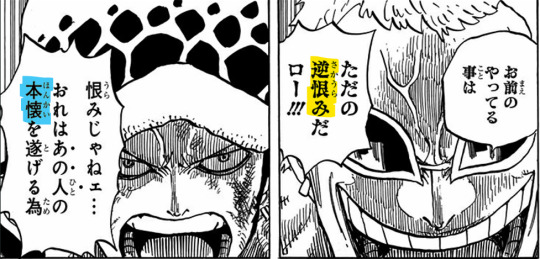
Doflamingo says 逆恨み (sakaurami) which means unjustified resentment or unreasonable grudge. Law, in turn, denies this and says he is there to fulfill that person's 本懐 (hon'kai) which means (one's) long-cherished desire.

What is that desire, you may ask? Corazon shared it when he spoke for the first time with Law: His purpose/motivation/goal is to stop Doflamingo's 暴走 (bousou), which is translated as rampage.
(Later on, it was further revealed in the flashback and confirmed by Doflamingo that Corazon was trying to save Dressrosa--and the ever manipulative little shit hoped to rattle Law's feelings about screwing up in passing the message that Corazon asked him to do 13 years ago but he was able to keep his calm.)
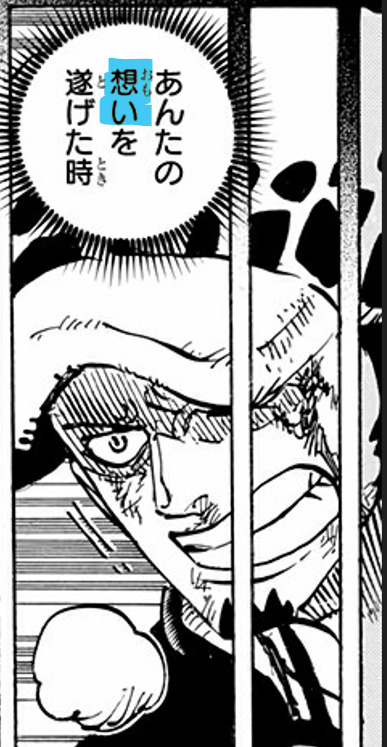
The next time that Law thought about his motivation, specifically, the moment that he will be truly free is the time that Corazon's 思い (omoi) will be fulfilled/granted/come to fruition. 思い (omoi) could be translated differently depending on the context. For this one, it refers to desire or wish--a nod to Corazon's purpose, to stop Doflamingo.
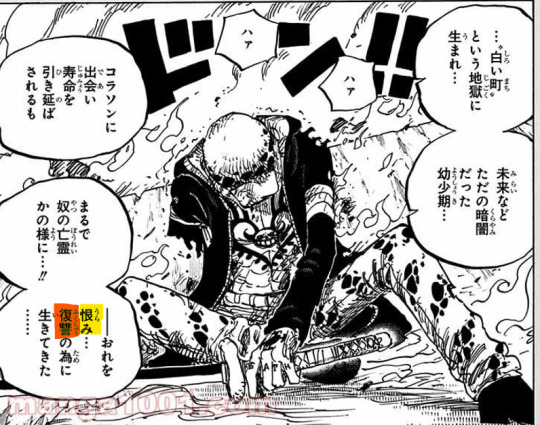
Doflamingo didn't even scrimp with his descriptions as he used both 恨み (urami) which means resentment, grudge, malice, bitterness; and 復讐 (fukushuu) directly translated as revenge. He even says that Law is acting like Corazon's vengeful ghost. He views Law's persistent defiance to carry out Corazon's wish as pointless, even going through the effort of saying that Law has been overtaken with his feelings--however, when he saw the Corazon at the back of Law's coat, he riddled him with bullets and even saying that both Law and Corazon's curse have ended.

Lastly, and I think this is where Law's motivation reached its reveal in full circle. He says that he lived for the past 13 years to do this and he used 討つ (utsu) which, in this context, can be translated as to attack, to destroy, to defeat, and surprisingly, to avenge. This part is up for interpretation, really.
(My two cents on it is Law's main focus on wanting to take down Doflamingo stemmed from wanting to carry out Corazon's purpose, however, I am not necessarily dismissing the part of wanting to take responsibility and avenge Cora's death.)
Ending this self-indulgent meta post with Law giving the middle finger because Toei decided to not include this badass moment. LMAO.
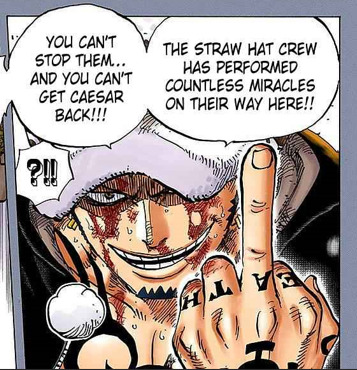
#one piece#one piece meta#trafalgar law#donquixote doflamingo#law#doflamingo#donquixote rosinante#rosinante#cora-san#rewatching dressrosa and noticing those details jhsdjhdjs#I should study Japanese seriously#mochiajclayne.txt
242 notes
·
View notes
Note
Hello!! I hope you're having a good day ^^
I came across your post about writing non-linearly on Notion and I'm excited to try it out because the advice resonated with me! Though, I'm really new to using the app and, if possible, need help with how to do this part: 'where every scene is a separate table entry and the scene is written in the page inside that entry.' ;v;
Hello! Thank you so much for messaging!!!
Since that post about writing non-linearly (linked for context) blew up roughly ten thousand times as much as anything I've ever posted, I've been kind of meaning to make a followup post explaining more about how I use Notion for writing non-linearly, but, you know, ADHD, so I haven't done it yet. XD
In the meantime, I'll post a couple screenshots of my current long fic with some explanations! I'd make this post shorter, but I'm unable to not be Chatty. XD (just ask my poor readers how long my author notes are...)
(There is a phone app as well which syncs with the desktop/browser versions, but I work predominantly in the desktop app so that's what I'm gonna be showing)
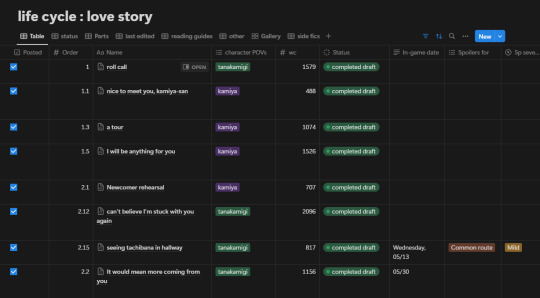
(the table keeps going off the right side of the image but it's a bunch of unimportant stuff tbh)
So this is more complicated than what you'll probably start with because I'm Normal and add a bunch of details that you might not need depending on what you're doing. For example, my fic switches POVs so I have a column for tracking that, and my fic follows a canon timeline so I have a column for dates so I can keep track of them, and I also made columns for things like if a scene had spoilers or certain content readers may want to avoid, which they can access in my spoiler and content guide for the fic. (As I said, I'm Normal.) I also do some complicated stuff using Status and estimated wordcount stuff to get an idea of how long I predict the content to be, but again, not necessary.
Anyway, you don't need any of that. For the purposes of this explanation, we're just gonna look at the columns I have called Name, Order, and Status. (And one called Part, but we'll get into that later)
Columns in Notion have different types, such as Text, Numbers, Select, Date, etc, so make sure to use the type that works best for the purpose of each column! For example, here I'm using Select for Character POVs, Number for Order and WC (wordcount), and Text for the In-Game Date.
Okay let's get into it!
Name is a column that comes in a Notion table by default, and you can't get rid of it (which drives me up the wall for some purposes but works totally fine for what we're doing here). As you can see on the scene I've labeled 'roll call', if you hover over a Name entry, a little button called 'Open' appears, which you click on to open the document that's inside the table. That's all default, you don't have to set anything up for it. Here's a screenshot of what it looks like when I click the one titled 'I will be anything for you' (I've scrolled down in the screenshot so you can see the text, but all the data fields also appear at the top of the page)
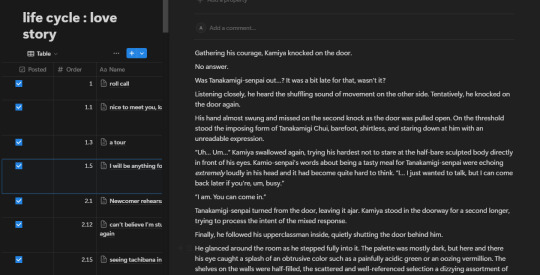
(This view is called 'side peek' meaning the document opens on one side and you can still see the table under it on the left, which is what mine defaults to. But you can set it to 'center peek' or 'full page' as well.)
All my scenes have their own entry like this! Note that I've said scenes, not chapters. I decide the chapters later by combining the scenes in whatever combination feels right, which means I can often decide in advance where my chapter endings will be. This helps me consciously give most of my endings more impact than I was usually able to do when I tried to write linearly.
So hopefully that gives you an idea of what I mean by writing inside the table and treating the table as a living outline.
The 'Status' column is also pretty straightforward, and might require a little setup for whatever your needs are. This is another default column type Notion has which is similar to a Select but has a few more specialized features. This is how mine is set up:
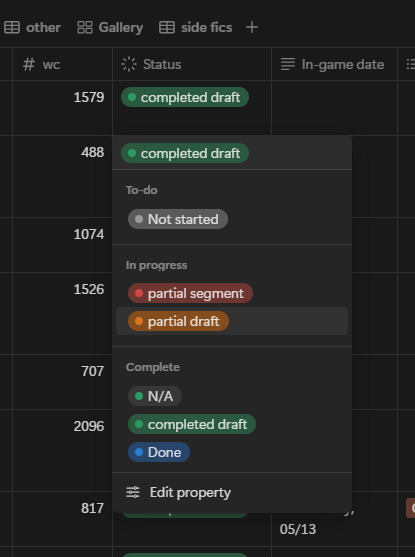
(I don't actually use 'Done', idk why I left it there. Probably I should replace it with 'Posted' and use that instead of the checkmark on the far left? whatever, don't let anyone tell you I'm organized. XDD)
Pretty straightforward, it just lets me see easily what's complete and what still needs work. (You'll notice there's no status for editing, because like I mentioned in my other post, I don't ever sit down to consciously edit, I just let it happen as I reread) Obviously tailor this to your own needs!
The Order column is sneakily important, because this is what makes it easy for me to keep the scenes organized. I set the Sort on the table to use the Order to keep the scene ordered chronologically. When I make the initial list of scenes I know the fic will have, I give all of them a whole number to put them in order of events. Then as I write and come up with new scene ideas, the new scenes get a number with a decimal point to put them in the spot they fit in the timeline. (you can't see it here, but some of them have a decimal three or four digits deep, lol). Technically you can drag them to the correct spot manually, but if you ever create another View in your table (you can see I have eight Views in this one, they're right under the title) it won't keep your sorting in the new View and you'll hate yourself when it jumbles all your scenes. XD (And if you get more comfortable with Notion, you probably will at some point desire to make more Views)
The Part column isn't necessary, but I found that as the fic grew longer, I was naturally separating the scenes into different points along the timeline by changes in status quo, etc. (ex. "this is before they go overseas" "this is after they speak for the first time", stuff like that) in my mind. To make it easier to decide where to place new scenes in the timeline, I formalized this into Parts, which initially I named with short summaries of the current status quo, and later changed to actual titles because I decided it would be cool to actually use them in the fic itself.
Since it's not in the screenshots above, here's what the dropdown for it looks like:
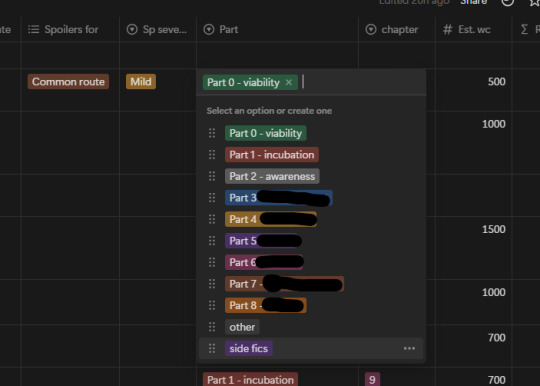
(I've blocked some of the titles out for spoiler reasons)
Basically I only mention the Parts thing because I found it was a useful organizational tool for me and I was naturally doing it in my head anyway.
Anyway, I could keep talking about this for a really long time because I love Notion (don't get me started on how I use toggle blocks for hiding content I've edited out without deleting it) but that should be enough to get started and I should really, you know, not make this another insanely long post. XDD
And if anybody is curious about how the final results look, the fic can be found here.
#notion#writing resources#writing advice#writing#writers block#writers on tumblr#writeblr#nonlinear#fanfic#fanfiction
310 notes
·
View notes
Text
Halsin and abandonment issues
One thing I've come to conclude about Halsin's character, based on many parts of his story and some lines he says, is that he might have abandonment issues.
To begin with: he lost his entire family over the years to accidents and disease, per his writer. That's the kind of thing that leaves deep scars- watching everyone you love fade away over years, until at a "comparatively young age" you're the last of your family and turned over to the Druids to be taken care of. (His writer didn't specify an age, but if he was young enough to be "turned over to the Druids" instead of "finding his way there" then it is likely he was not an adult.) There's no time to lose your family that isn't absolutely horrible, but as a young person is far, far worse.
Then there's Halsin's other traumas, all of which involve isolation; he was a prisoner for three years in the Underdark, and despite this, no one thought to come looking for him to save him. He lost most of his fellow Druids in the battle against Ketheric Thorm and the Shadow Curse that followed- and what few didn't die, he still lost their friendship to his leadership position, the "weight of responsibility". His one lasting friend in all of this, Thaniel, was lost to the curse and Halsin spent over 100 years blaming himself, fighting to be the best leader he could at the Grove, and having no one at all he could lean on for any of his burdens. And then he wound up kidnapped again, this time by the goblins, and when he returns, almost all his Druids have been turned against him, some even holding him in contempt. All experiences that are isolating in nature and reinforce to him that he can't rely on anyone else, that he is the only person he can depend on, and that in the end, everyone he cares for is going to leave or die.
It's not just speculation that he feels that way, either. He has several lines about his survivor guilt and isolation:
"[...] there is a burden to being the survivor... the witness to others' tragedies. It only grows heavier with time."
"[...] Grim as it is now, it was worse on the day of the battle. A vivid wound upon my memory. I was lucky - I lived, when so many did not. It would take me a day and a night to recite the names of all the friends I lost."
And lines that indicate he's used to being left, too.
If the player rejects him after he wildshapes (emphasis mine):
"Ah, I see. Well, of course. Back to camp then."
Saying "of course" implies it's not entirely unexpected.
After the final battle, if the player declines to have a celebration and says the party should split up:
"It was always destined to be so, if we prevailed. But the foreknowledge makes it no less bittersweet..."
He was expecting the party not to stick together.
Similarly, if a love-interest player breaks up with him in the ending:
"I see... After all my years of living, I know all too well that nothing lasts forever. Yet a parting can sting, nonetheless. But that just means what we shared was precious, and will live on in my memory. Thank you - I am a richer man for having met you."
The "nothing lasts forever" really sells it, to me, especially because the context makes it clear that he isn't just making a general statement- he's talking about relationships and people. Again- he was expecting it all to end.
His worry in the epilogue, when a solo-romanced player comes to the party with him, hints at this even more: "You could have done anything, gone with anyone... yet you chose me."
He's surprised that the player, even if they're in love, would want to live with him and share his dream. He can't believe they really wanted that- he even says that he keeps expecting to "stir from the dream".
I feel like that shows a lot about how Halsin feels after all the loss he's endured- he doesn't ultimately believe anyone is going to stay with him, whether because they choose to leave him, or because they'll die.
518 notes
·
View notes
Text
How I deal with shapes


@spadefish @kobothesmall So for shapes, the way I work with them is from studying how things break down individually, instead of following a broader ruleset for character design that you see a lot in tutorial posts (the triangle, square, circle theorem basically).
The way shapes work in humans is different from other animals (which also differ from each other), which is different from objects. The same shape can be used for different goals depending on what you're drawing. So there's no one size fits all, and especially in styles that have a bit more of realism going on, those shapes will behave differently than extremely cartoony styles.
Process wise, a lot of it ends up happening in my head than in the canvas, because I spent years dealing with this shape philosophy of "just bang your head for each thing you're drawing", which I understand is very tedious to some people, but I love studying individual things vs following tutorials because it teaches me 1. how that thing works in a context 2. gives me a new book to my visual library which I can pull from, which is often what happens! That, and a lot of it is just staring at references too. Still, I'll try to draw something up for this.
There are 2 ways to approach shape design. You either start with the shapes and then apply a concept to it, or you start with a concept and apply shapes to it. The former is much harder to do without practice (and also comes more in concept art which is rough, unfinished and meant to be done and redone dozens of times by design). So, I tend to do the latter: I start with a concept of what I want. This can be as simple as "I just want a character that's fat/standing" or more abstract like "I want a character that feels like a river/I want this to feel like an outburst".
Let's start with a concrete concept: I want a design that looks like a pacman frog, and just a standing pose that isn't too stiff.
I grab some pacman frog references, and sometimes if the pose is complex, I'll find references for that too. Pacman frogs are pretty pudgy, and their legs aren't that long compared to most frogs, even when unfolded, and their faces have a nice triangle-ish forehead with a nice shape for the mouth.

The result is that i use large shapes for most of the body. Curves contrast with sharper lines, giving the sense of something geometric but still organic. The line of action here helps me pose these shapes in a way that gives some movement to something as simple as standing (and you'll gain a lot of mileage from learning how to rotate shapes! this is how you're able to position them in different ways and create more dynamic poses).
For something more abstract, like a crouched pose meant to be angry, I take some references when i can and start doing something like this:

Note that these shapes seem weird because I'll have a naked fullbody wip below any clothed characters to have some anatomical guidance, but for actual final shapes and silhouette, what matters is the final elements, and that includes clothes! so i try to build shapes that emphasize this droopy, closed off feeling. This sketch isn't even that good really, there's plenty of errors, but I hope it gives an idea of whats going on.
I hope this weird rambly nonsense helped LOL
219 notes
·
View notes
Text
Every now and then I think about how subtitles (or dubs), and thus translation choices, shape our perception of the media we consume. It's so interesting. I'd wager anyone who speaks two (or more) languages knows the feeling of "yeah, that's what it literally translates to, but that's not what it means" or has answered a question like "how do you say _____ in (language)?" with "you don't, it's just … not a thing, we don't say that."
I've had my fair share of "[SHIP] are [married/soulmates/fated/FANCY TERM], it's text!" "[CHARACTER A] calls [CHARACTER B] [ENDEARMENT/NICKNAME], it's text!" and every time. Every time I'm just like. Do they though. Is it though. And a lot of the time, this means seeking out alternative translations, or translation meta from fluent or native speakers, or sometimes from language learners of the language the piece of media is originally in.
Why does it matter? Maybe it doesn't. To lots of people, it doesn't. People have different interests and priorities in fiction and the way they interact with it. It's great. It matters to me because back in the early 2000s, I had dial-up internet. Video or audio media that wasn't available through my local library very much wasn't available, but fanfiction was. So I started to read English language Gundam Wing fanfic before I ever had a chance to watch the show.
When I did get around to watching Gundam Wing, it was the original Japanese dub. Some of the characters were almost unrecognisable to me, and first I doubted my Japanese language ability, then, after checking some bits with friends, I wondered why even my favourite writers, writers I knew to be consistent in other things, had made these characters seem so different … until I had the chance to watch the US-English dub a few years later. Going by that adaptation, the characterisation from all those stories suddenly made a lot more sense. And the thing is, that interpretation is also valid! They just took it a direction that was a larger leap for me to make.
Loose adaptations and very free translations have become less frequent since, or maybe my taste just hasn't led me their way, but the issue at the core is still a thing: Supernatural fandom got different nuances of endings for their show depending on the language they watched it in. CQL and MDZS fandom and the never-ending discussions about 知己 vs soulmate vs Other Options. A subset of VLD fans looking at a specific clip in all the different languages to see what was being said/implied in which dub, and how different translators interpreted the same English original line. The list is pretty much endless.
And that's … idk if it's fine, but it's what happens! A lot of the time, concepts -- expressed in language -- don't translate 1:1. The larger the cultural gap, the larger the gaps between the way concepts are expressed or understood also tend to be. Other times, there is a literal translation that works but isn't very idiomatic because there's a register mismatch or worse.
And that's even before cultural assumptions come in.
It's normal to have those. It's also important to remember that things like "thanks I hate it" as a sentiment of praise/affection, while the words translate literally quite easily, emphatically isn't easy to translate in the sense anglophone internet users the phrase.
Every translation is, at some level, a transformative work. Sometimes expressions or concepts or even single words simply don't have an exact equivalent in the target language and need to be interpreted at the translator's discretion, especially when going from a high-context/listener-responsible source language to a low-context/speaker-responsible target language (where high-context/listener responsible roughly means a large amount of contextual information can be omitted by the speaker because it's the listener's responsibility to infer it and ask for clarification if needed, and low-context/speaker-responsible roughly means a lot of information needs to be codified in speech, i.e. the speaker is responsible for providing sufficiently explicit context and will be blamed if it's lacking).
Is this a mouse or a rat? Guess based on context clues! High-context languages can and frequently do omit entire parts of speech that lower-context/speaker-responsible languages like English regard as essential, such as the grammatical subject of a sentence: the equivalent of "Go?" - "Go." does largely the same amount of heavy lifting as "is he/she/it/are you/they/we going?" - "yes, I am/he/she/it is/we/you/they are" in several listener-responsible languages, but tends to seem clumsy or incomplete in more speaker-responsible ones. This does NOT mean the listener-responsible language is clumsy. It's arguably more efficient! And reversely, saying "Are you going?" - "I am (going)" might seem unnecessarily convoluted and clumsy in a listener-responsible language. All depending on context.
This gets tricky both when the ambiguity of the missing subject of the sentence is clearly important (is speaker A asking "are you going" or "is she going"? wait until next chapter and find out!) AND when it's important that the translator assign an explicit subject in order for the sentence to make sense in the target language. For our example, depending on context, something like "are we all going?" - "yes" or "they going, too?" might work. Context!
As a consequence of this, sometimes, translation adds things – we gain things in translation, so to speak. Sometimes, it's because the target language needs the extra information (like the subject in the examples above), sometimes it's because the target language actually differentiates between mouse and rat even though the source language doesn't. However, because in most cases translators don't have access to the original authors, or even the original authors' agencies to ask for clarification (and in most cases wouldn't get paid for the time to put in this extra work even if they did), this kind of addition is almost always an interpretation. Sometimes made with a lot of certainty, sometimes it's more of a "fuck it, I've got to put something and hope it doesn't get proven wrong next episode/chapter/ten seasons down" (especially fun when you're working on a series that's in progress).
For the vast majority of cases, several translations are valid. Some may be more far-fetched than others, and there'll always be subjectivity to whether something was translated effectively, what "effectively" even means …
ANYWAY. I think my point is … how interesting, how cool is it that engaging with media in multiple languages will always yield multiple, often equally valid but just sliiiiightly different versions of that piece of media? And that I'd love more conversations about how, the second we (as folks who don't speak the material's original language) start picking the subtitle or dub wording apart for meta, we're basically working from a secondary source, and if we're doing due diligence, to which extent do we need to check there's nothing substantial being (literally) lost -- or added! -- in translation?
#translation#linguistics (sorta)#I love language so much#long post#subtitling#dubbing#transformative work#if you read all the way to the end - THANK YOU I am so impressed#localisation#this is not an academic essay but I still feel bad for not citing sources#low vs high context cultures and languages are concepts from intercultural communication studies#but idk how up to date that is or whether folks even still actually use them#I know they oversimplify things#but it helped me say what I was trying to here so shrug#languages#language soup#meta#language meta#fandom meta of sorts#thanks for the help sorting this out kayla <3#my nonsense
1K notes
·
View notes
Text
The gender of the person that Teru likes and the wrong translation in this scene, a really small analysis:
(Reuploaded here bc a month ago I uploaded it to Twitter and no one saw it... )
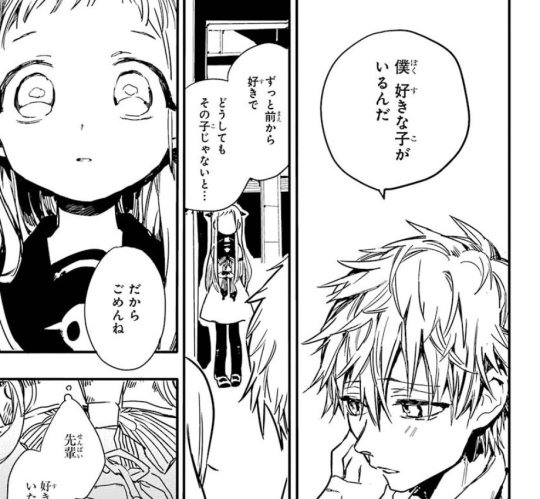
Okay, all of this investigation started bc I asked myself “what if teru actually likes aoi (girl)” And this scene came to my mind, i didn’t remember what he exactly said (about if was a girl) so i rewatched it after. If you want the short answer is no, teru doesn’t mention gender.
If you want the explication, read this post (pls this took me like two hours to investigate )
Let’s begin with the dubbed scene, where he says “her” referencing that hes crush is a girl. I almost added the subtitled scene but I didn’t bc it says the same lol
So, I went to the manga, if i was correct, i remembered that he never said the gender/ pronouns, and I was right
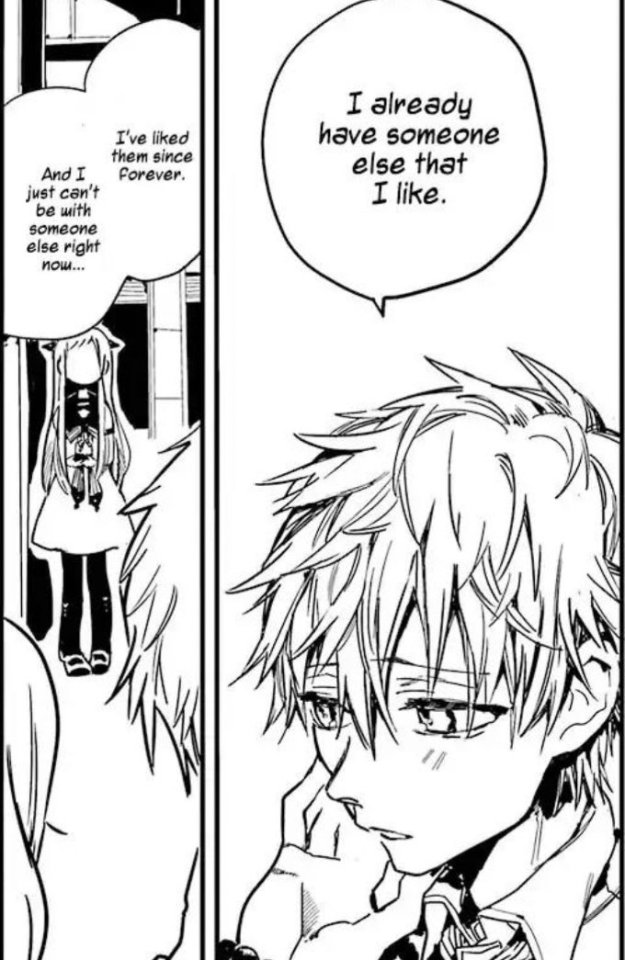
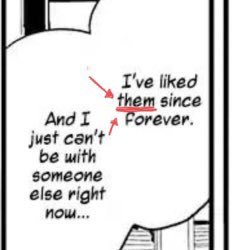
I could have confirmed that, but I wasn't convinced. What if the MANGA was poorly translated?
So, i went to the raws panels.

“But Venus! I don’t speak Japanese, what says there?” If you translate ぃ僕 好きな子が ぃるんだ on google, the first option is “there’s a girl I like” but ALSO shows up the option “there’s someone I like”
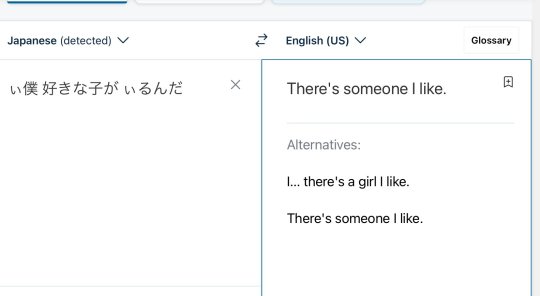
"but it is implied that is a girl, otherwise It would give the option of "there is a boy that I like"" be patient my little friend, let me explain you:
I started to investigate deeply the kanjis, conjugations and things like that, after a while I learned what I am going to tell you and now I understand why it is simplified to the feminine gender
The translation of ぃ僕 好きな子が ぃるんだ depends on the context and the tone of the phrase. In general, it can be translated as “there’s a girl I like” or “there’s someone I like”, but it can also have other meanings
According to the DeepL dictionary, “ 僕”is an informal and affectionate way of saying “I” or “me”, which is mainly used by young men. 好きな子 means “child/person I like”, and does not specify the gender of the person.
ぃるんだ is a colloquial way of saying “there is” or “there are”, which expresses emphasis or confession.
Therefore, the phrase could express the feeling of a boy who likes a girl, or a girl who likes a boy, or a person who likes another person regardless of gender
So, in the translation (anime dub and sub) it refers to a girl bc the "僕" (mostly used by young men,who teru is ) and the 好きな子 which refers to liking someone, it can be assumed that it refers to a girl because of the assumed heterosexuality, you know lol
it is never confirmed that “them” is a GIRL, the gender is never mentioned, so there are chances that the person he likes is not a girl. Obviously them could be one, I don't deny it, but it also doesn't rule out the possibility that Teru being queer.
Conclusion: the manga in English is well translated but not the anime, the person Teru likes can be either a boy or a girl. End of explication.
And if you're wondering, could I find the answer to the initial question? Well no, but it reduces the options for Aoi to be who he likes, since it doesn't boil down to her just being a girl, which leaves other options.
But then who could be the person Teru likes? Well, I don't know, but I could make a thread theorizing about it.
*cought* *cought* 𝒶𝓀𝒶𝓃𝑒 *cought* *cought*
#teru minamoto#tbhk#tbhk teru#terukane#minamoto teru#toilet bound hanako kun#jibaku shounen hanako kun#tbhk analysis
322 notes
·
View notes
Text
alexia is back in mexico today for an event as scotiabank ambassador, where she has some important words on growing up with privilege and how to help those who aren't so lucky. (also putting those business school words to use!😮💨)
but girlie is not getting any vacation time! someone's voice is in need of a trip to eivissa after all these press conferences and quick turnaround from country to country. booked and busy! 🏝️
"good morning. well, what moves me mainly is to know, which is a reality, of course, not everyone has the same opportunities that often depends on where you are born, unfortunately, in what context or what family environment you can have, right? so, well, it is something that i think that as we grow up we are aware of and the truth is that it has a lot to do with it. when i had the knee injury, we athletes are competing every three days and we go to the finish line very mentally prepared. at the time i had that injury there was no such goal, of course, because i had to recover, so i looked inside myself and i looked for what really made me feel alive, as football had done up to that moment, right? then i started to get to know, learn to meet and have conversations with people who have been working on these issues for a long time and it was something that was good for me, that i felt from inside, that i cared about knowing what i said at the beginning, that there are many girls and boys who do not have that opportunity, well it is clear that the world is very big and it is very complicated, but everything i can do to contribute my bit and if we can impact 100 girls, 200, 500 or how Scotiabank does it, that we are going to work together a lot and may there be many more.
well, i think that in order to understand what is missing, we have to understand how or when everything started, right? and i believe that each country has had its starting time in a different way. we have the example of the united states, which started much earlier than many countries, or at least than spain. and i think that also marks the level of development or the maturity of women's football in each country. in spain, for example, i think it has started relatively recently. it is clear that we are in a process that is necessary to walk, to make way to really get where we all want, which is in the good, in the best conditions at the labour level, in that this industry grows by itself and is solvent. also having clear that at the beginning in practically no sport in the world has ever been solvent. so having that patience, also that business vision that of course corresponds to the executives and managers, and us, to be the best prepared with the best tools they are giving us to be able to offer a better show. and in the end it is a circle, a circle for everything to grow."
source: @TVCDeportes on twitter
149 notes
·
View notes
Text
PROOF THAT SHINRAN IS ONE OF THE MOST BRILLIANTLY WRITTEN ROMANCES OF ALL TIME - PART 4
symbolism
disclaimer: gosho's imagery is subtle and therefore often overlooked, so in order to highlight it, i'll be referencing the work of suzanne collins, an author who tends to spell out her metaphors more
sharks
chapter 882-884
how the case begins:
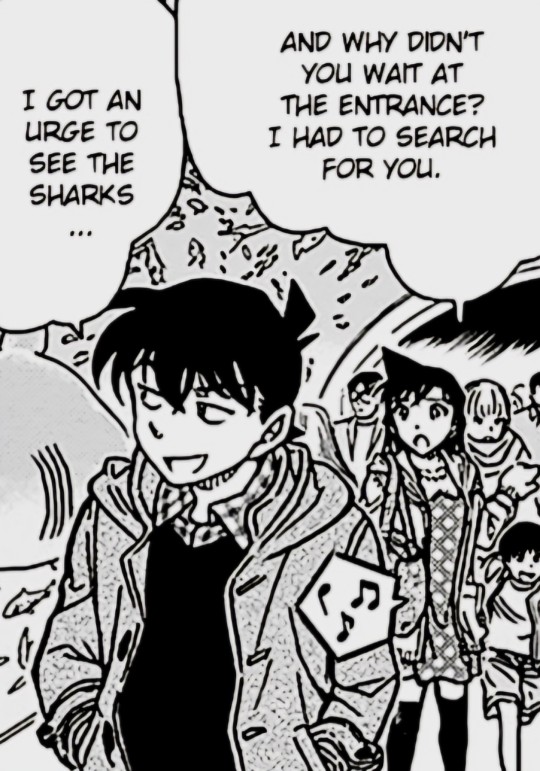
how it progresses:
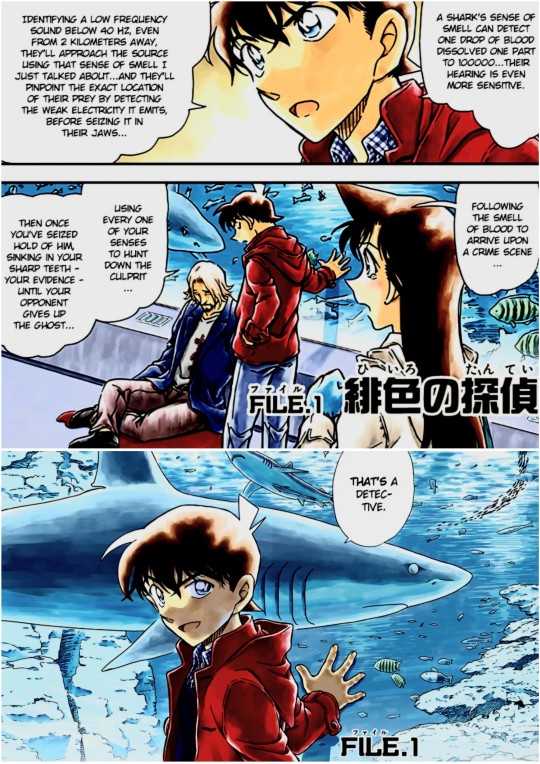
this isn't gosho's first time exploring the theme of sharks in the manga:
chapter 311
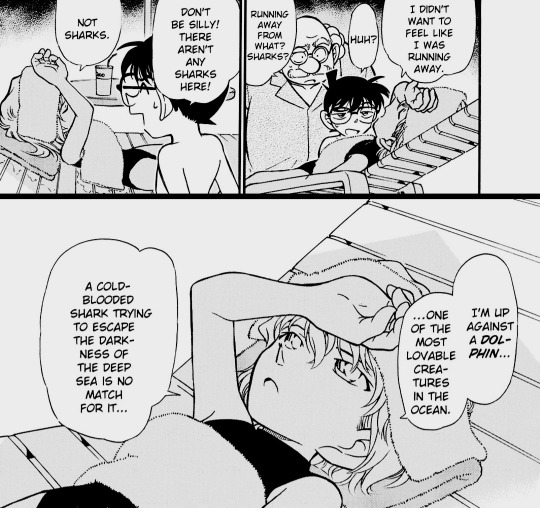
both shinichi and haibara relate to sharks, they're self-admittedly drawn to blood and darkness. but why?
haibara was born into it, she didn't have a choice... and even though she's no longer a part of the black organization, she still carries the past with her.
shinichi on the other hand? he seeks it out. he directly confronts it, because he wants to defeat it. his unfaltering idealism is what pushes him to be a shark.
ran is very idealistic too, which i talk about here. so why doesn't she act like a shark?
"Finnick knows then what Haymitch and I know. About Peeta. Being truly, deep-down better than the rest of us." - Suzanne Collins, Catching Fire Chapter 19
the closest that gosho comes to spelling it out like this, is haibara's line about ran "i'm up against dolphin, one of the most loveable creatures in the ocean"
ran's defined by more than her virtuous nature, she's also unbelievably compassionate and sensitive. that's what makes her a dolphin.
her unmatched kindness is constantly displayed throughout the whole manga.
sometimes it irks shinichi:
chapter 787
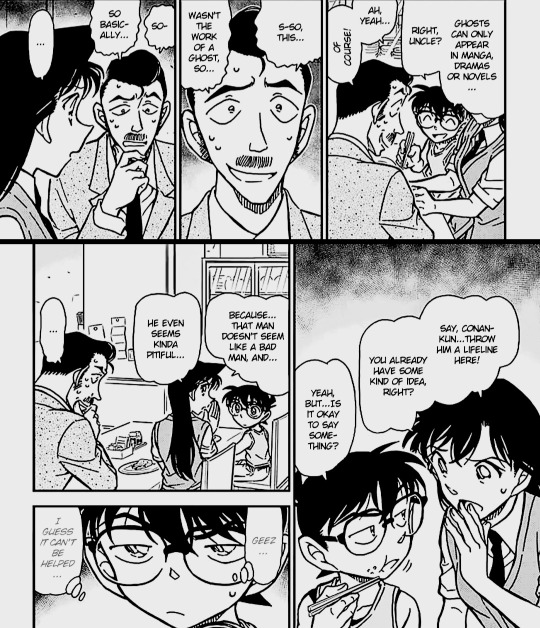
sometimes it hurts him:
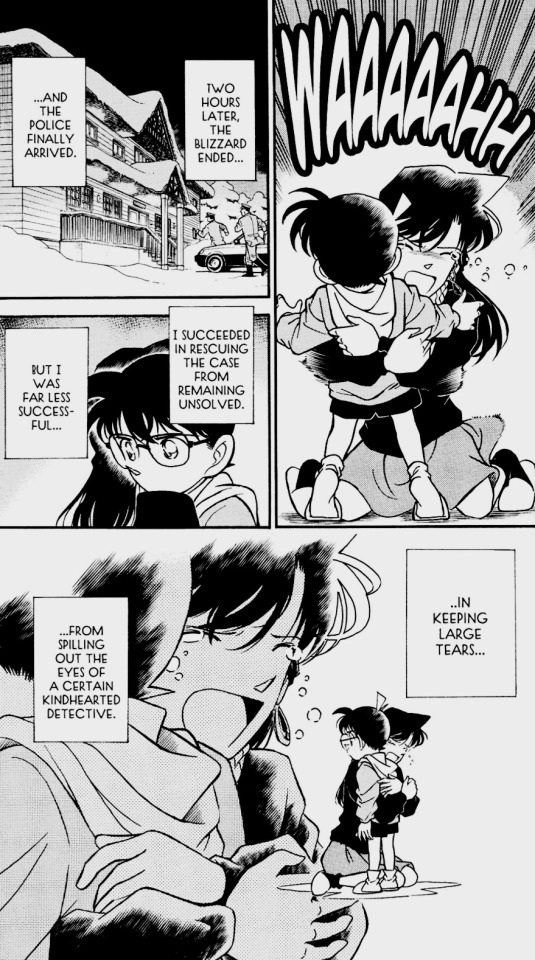
but most of the time it baffles and touches him:
chapter 258
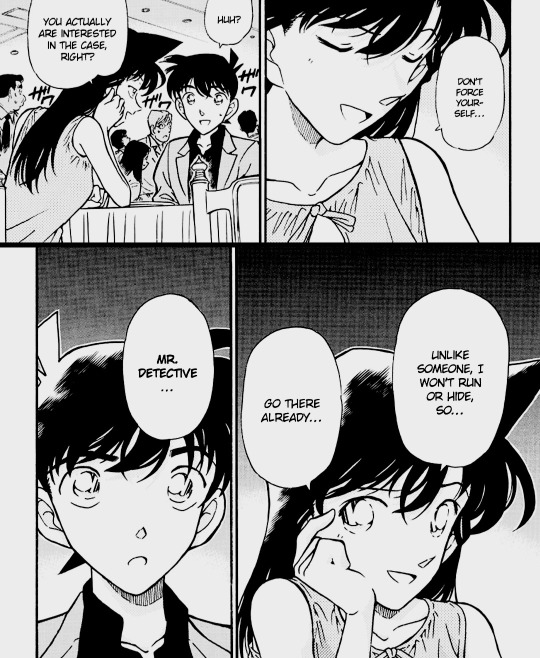
now i'm going to say something that might be controversial: from what i've gathered, shinichi doesn't just appreciate ran's tender heart... he depends on it.
and i'm not saying that lightly, i'm aware that ran's caring nature affects a lot of dcmk characters - it's the reason why vermouth calls her an angel, why haibara refers to her as a dolphin and sees her as a sister figure, hell, it's the reason why kogoro's able to function most of the time.
but i'd still argue that nobody relies on it the way shinichi does, which brings me to the next symbol i want to analyze:
cherry blossom
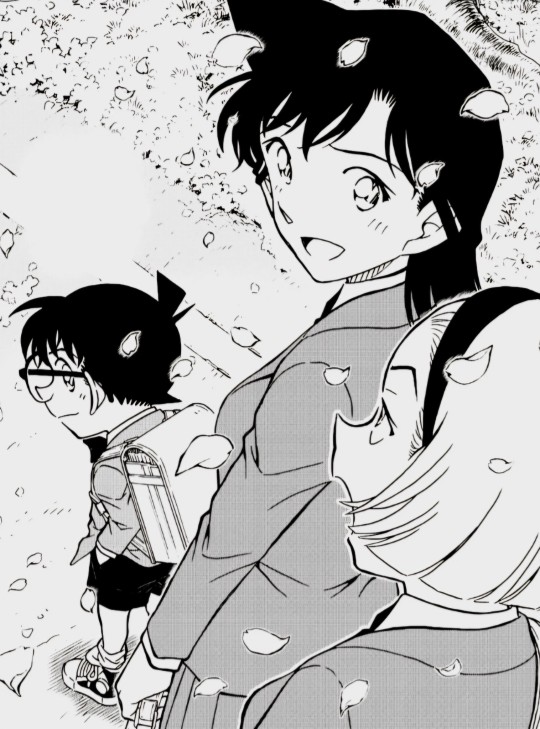
flowers can represent a variety of concepts, depending on your source and in what context you use them for your writing. the same rule applies to cherry blossoms.
gosho's used it as symbol for justice in the past:
chapter 687

it's interesting to look at it through that lense, but i don't think that's what the cherry blossom represents for shinichi.
after doing some research, i came to the realization that cherry blossoms are widely believed to symbolize hope and the beginning of spring.
i think that interpretation makes a lot more sense for shinran. especially if we examine their first interaction:
chapter 924
shinichi shows ran his deduction skills to impress her... ironically he ends up impressing everyone but her. shinichi's condescension leads to a full-blown argument:
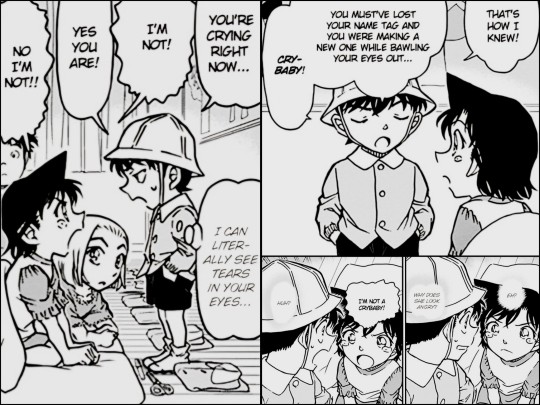
but then something completely unexpected happens... despite the fact that they don't know each other, despite the fact that shinichi insults ran, despite the fact that ran's completely put off by his arrogance, despite all of that... she offers him a cherry blossom and along with it the kindest smile he's ever seen:
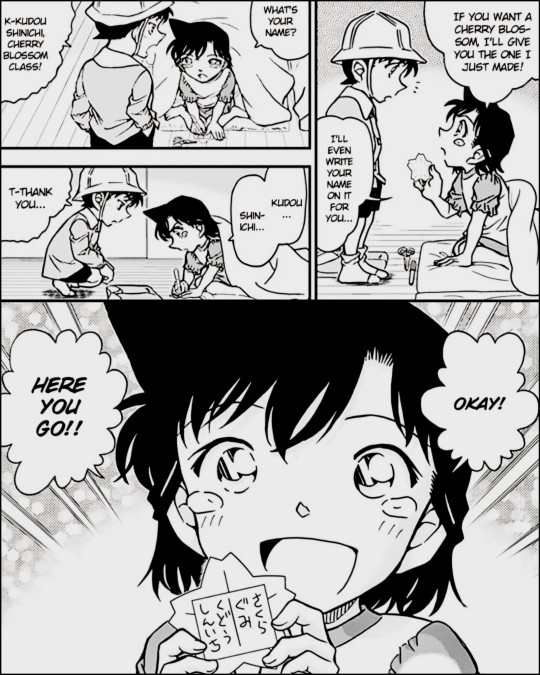
and i just can't help feeling like ran's cherry blossom is symbolically very similar to suzanne's dandelion:
"I found him staring at me from across the school yard. Our eyes met for only a second, then he turned his head away. I dropped my gaze, embarrassed, and that’s when I saw it. The first dandelion of the year. A bell went off in my head. I thought of the hours spent in the woods with my father and I knew how we were going to survive. To this day, I can never shake the connection between this boy, Peeta Mellark, and the bread that gave me hope, and the dandelion that reminded me that I was not doomed. And more than once, I have turned in the school hallway and caught his eyes trained on me, only to quickly flit away." - Suzanne Collins, The Hunger Games Chapter 3
"What I need to survive is not Gale’s fire, kindled with rage and hatred. I have plenty of fire myself. What I need is the dandelion in the spring. The bright yellow that means rebirth instead of destruction. The promise that life can go on, no matter how bad our losses. That it can be good again. And only Peeta can give me that." Suzanne Collins, Mockingjay Chapter 27
and clearly, only ran can give that to shinichi...
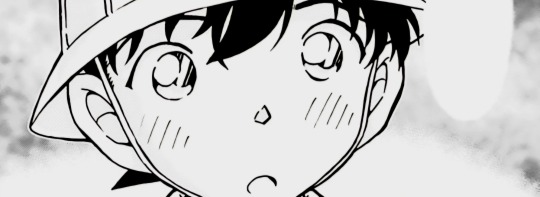
let me further elaborate by revisiting the shark analogy:
the most beautiful dolphin in the sea sees a shark like him, calls him out on his bluff and instead of avoiding him, she actually welcomes him. ran shows him genuine affection, despite having so many reasons not to. how could he not fall for her?
for someone like shinichi, a cool shark who's able to recognize other predators in the sea from such a young age, seeing the innocence and warmth of a dolphin is pivotal for him, because it reminds him that there's so much more to life than constantly familiarizing himself with other sharks (in his childhood by reading and later by investigating them)... there's good too.
to summarize... shinichi sees a delicate cherry blossom, a gentle dolphin and holds on to her for dear life. he desperately clings to the promise of hope and spring, he depends on her affection and warmth. he needs ran, because without her winter would never end, he'd never escape to coldness of the sea, he'd freeze.
which explains why
a) he's so protective of her
b) ran's smile serves as a compass for shinichi throughout the whole story - while his mind is busy chasing sharks, shinichi's soul is persistently searching for the same smile that strummed his heartstrings all these years ago. which is why he immediately notices when ran's not okay (even though she's very skilled at concealing her pain) and why he always tries to make her feel better
and that's ultimately why
a) shinichi's keeping his identity a secret
b) he's so focused on getting his old body back
without ran, shinichi wouldn't have a constant inner conflict as conan, without her, he'd lack purpose and as a result, detective conan would be empty and lifeless.
ran's not just a love interest y'all...
she's the heart of the entire manga.
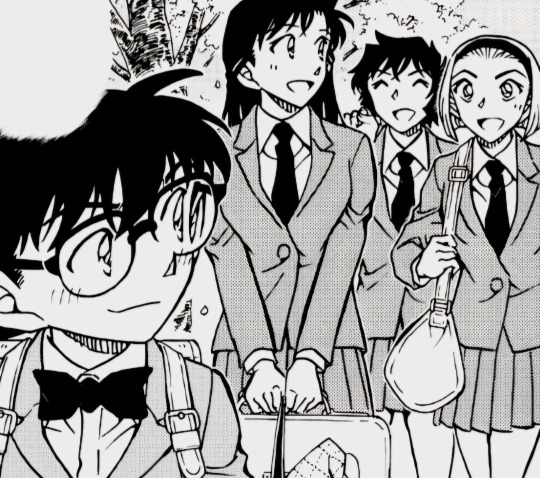
visit the shinran library for more
179 notes
·
View notes